#end user computing services
Explore tagged Tumblr posts
Text

End User Computing Solutions Services for Business Efficiency
Discover advanced End User Computing Solutions Services designed to enhance employee productivity and streamline IT operations. From secure virtual desktop infrastructure and mobile device management to application delivery and user support, we offer tailored solutions to meet your business needs. contact us today at +1 3023132433.
0 notes
Text
Cybercriminals are abusing Google’s infrastructure, creating emails that appear to come from Google in order to persuade people into handing over their Google account credentials. This attack, first flagged by Nick Johnson, the lead developer of the Ethereum Name Service (ENS), a blockchain equivalent of the popular internet naming convention known as the Domain Name System (DNS). Nick received a very official looking security alert about a subpoena allegedly issued to Google by law enforcement to information contained in Nick’s Google account. A URL in the email pointed Nick to a sites.google.com page that looked like an exact copy of the official Google support portal.
As a computer savvy person, Nick spotted that the official site should have been hosted on accounts.google.com and not sites.google.com. The difference is that anyone with a Google account can create a website on sites.google.com. And that is exactly what the cybercriminals did. Attackers increasingly use Google Sites to host phishing pages because the domain appears trustworthy to most users and can bypass many security filters. One of those filters is DKIM (DomainKeys Identified Mail), an email authentication protocol that allows the sending server to attach a digital signature to an email. If the target clicked either “Upload additional documents” or “View case”, they were redirected to an exact copy of the Google sign-in page designed to steal their login credentials. Your Google credentials are coveted prey, because they give access to core Google services like Gmail, Google Drive, Google Photos, Google Calendar, Google Contacts, Google Maps, Google Play, and YouTube, but also any third-party apps and services you have chosen to log in with your Google account. The signs to recognize this scam are the pages hosted at sites.google.com which should have been support.google.com and accounts.google.com and the sender address in the email header. Although it was signed by accounts.google.com, it was emailed by another address. If a person had all these accounts compromised in one go, this could easily lead to identity theft.
How to avoid scams like this
Don’t follow links in unsolicited emails or on unexpected websites.
Carefully look at the email headers when you receive an unexpected mail.
Verify the legitimacy of such emails through another, independent method.
Don’t use your Google account (or Facebook for that matter) to log in at other sites and services. Instead create an account on the service itself.
Technical details Analyzing the URL used in the attack on Nick, (https://sites.google.com[/]u/17918456/d/1W4M_jFajsC8YKeRJn6tt_b1Ja9Puh6_v/edit) where /u/17918456/ is a user or account identifier and /d/1W4M_jFajsC8YKeRJn6tt_b1Ja9Puh6_v/ identifies the exact page, the /edit part stands out like a sore thumb. DKIM-signed messages keep the signature during replays as long as the body remains unchanged. So if a malicious actor gets access to a previously legitimate DKIM-signed email, they can resend that exact message at any time, and it will still pass authentication. So, what the cybercriminals did was: Set up a Gmail account starting with me@ so the visible email would look as if it was addressed to “me.” Register an OAuth app and set the app name to match the phishing link Grant the OAuth app access to their Google account which triggers a legitimate security warning from [email protected] This alert has a valid DKIM signature, with the content of the phishing email embedded in the body as the app name. Forward the message untouched which keeps the DKIM signature valid. Creating the application containing the entire text of the phishing message for its name, and preparing the landing page and fake login site may seem a lot of work. But once the criminals have completed the initial work, the procedure is easy enough to repeat once a page gets reported, which is not easy on sites.google.com. Nick submitted a bug report to Google about this. Google originally closed the report as ‘Working as Intended,’ but later Google got back to him and said it had reconsidered the matter and it will fix the OAuth bug.
11K notes
·
View notes
Text
Kickstarting a book to end enshittification, because Amazon will not carry it

My next book is The Internet Con: How to Seize the Means of Computation: it’s a Big Tech disassembly manual that explains how to disenshittify the web and bring back the old good internet. The hardcover comes from Verso on Sept 5, but the audiobook comes from me — because Amazon refuses to sell my audio:
https://www.kickstarter.com/projects/doctorow/the-internet-con-how-to-seize-the-means-of-computation
Amazon owns Audible, the monopoly audiobook platform that controls >90% of the audio market. They require mandatory DRM for every book sold, locking those books forever to Amazon’s monopoly platform. If you break up with Amazon, you have to throw away your entire audiobook library.
That’s a hell of a lot of leverage to hand to any company, let alone a rapacious monopoly that ran a program targeting small publishers called “Project Gazelle,” where execs were ordered to attack indie publishers “the way a cheetah would pursue a sickly gazelle”:
https://www.businessinsider.com/sadistic-amazon-treated-book-sellers-the-way-a-cheetah-would-pursue-a-sickly-gazelle-2013-10
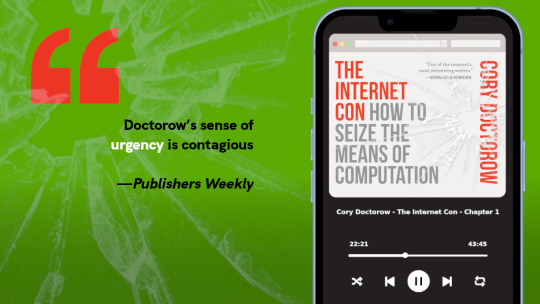
[Image ID: Journalist and novelist Doctorow (Red Team Blues) details a plan for how to break up Big Tech in this impassioned and perceptive manifesto….Doctorow’s sense of urgency is contagious -Publishers Weekly]
I won’t sell my work with DRM, because DRM is key to the enshittification of the internet. Enshittification is why the old, good internet died and became “five giant websites filled with screenshots of the other four” (h/t Tom Eastman). When a tech company can lock in its users and suppliers, it can drain value from both sides, using DRM and other lock-in gimmicks to keep their business even as they grow ever more miserable on the platform.
Here is how platforms die: first, they are good to their users; then they abuse their users to make things better for their business customers; finally, they abuse those business customers to claw back all the value for themselves. Then, they die:
https://pluralistic.net/2023/01/21/potemkin-ai/#hey-guys
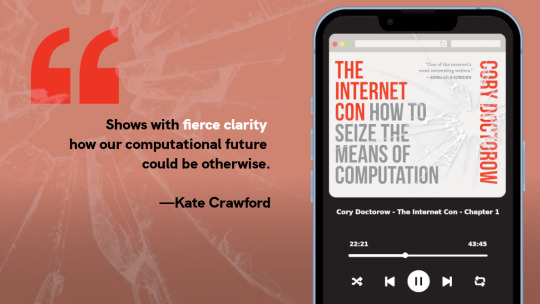
[Image ID: A brilliant barn burner of a book. Cory is one of the sharpest tech critics, and he shows with fierce clarity how our computational future could be otherwise -Kate Crawford, author of The Atlas of AI”]
The Internet Con isn’t just an analysis of where enshittification comes from: it’s a detailed, shovel-ready policy prescription for halting enshittification, throwing it into reverse and bringing back the old, good internet.
How do we do that? With interoperability: the ability to plug new technology into those crapulent, decaying platform. Interop lets you choose which parts of the service you want and block the parts you don’t (think of how an adblocker lets you take the take-it-or-leave “offer” from a website and reply with “How about nah?”):
https://www.eff.org/deeplinks/2019/07/adblocking-how-about-nah
But interop isn’t just about making platforms less terrible — it’s an explosive charge that demolishes walled gardens. With interop, you can leave a social media service, but keep talking to the people who stay. With interop, you can leave your mobile platform, but bring your apps and media with you to a rival’s service. With interop, you can break up with Amazon, and still keep your audiobooks.
So, if interop is so great, why isn’t it everywhere?
Well, it used to be. Interop is how Microsoft became the dominant operating system:
https://www.eff.org/deeplinks/2019/06/adversarial-interoperability-reviving-elegant-weapon-more-civilized-age-slay
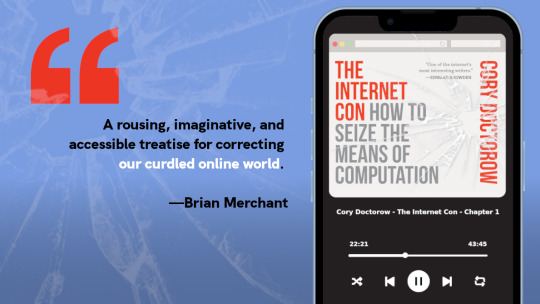
[Image ID: Nobody gets the internet-both the nuts and bolts that make it hum and the laws that shaped it into the mess it is-quite like Cory, and no one’s better qualified to deliver us a user manual for fixing it. That’s The Internet Con: a rousing, imaginative, and accessible treatise for correcting our curdled online world. If you care about the internet, get ready to dedicate yourself to making interoperability a reality. -Brian Merchant, author of Blood in the Machine]
It’s how Apple saved itself from Microsoft’s vicious campaign to destroy it:
https://www.eff.org/deeplinks/2019/06/adversarial-interoperability-reviving-elegant-weapon-more-civilized-age-slay
Every tech giant used interop to grow, and then every tech giant promptly turned around and attacked interoperators. Every pirate wants to be an admiral. When Big Tech did it, that was progress; when you do it back to Big Tech, that’s piracy. The tech giants used their monopoly power to make interop without permission illegal, creating a kind of “felony contempt of business model” (h/t Jay Freeman).
The Internet Con describes how this came to pass, but, more importantly, it tells us how to fix it. It lays out how we can combine different kinds of interop requirements (like the EU’s Digital Markets Act and Massachusetts’s Right to Repair law) with protections for reverse-engineering and other guerrilla tactics to create a system that is strong without being brittle, hard to cheat on and easy to enforce.
What’s more, this book explains how to get these policies: what existing legislative, regulatory and judicial powers can be invoked to make them a reality. Because we are living through the Great Enshittification, and crises erupt every ten seconds, and when those crises occur, the “good ideas lying around” can move from the fringes to the center in an eyeblink:
https://pluralistic.net/2023/06/12/only-a-crisis/#lets-gooooo

[Image ID: Thoughtfully written and patiently presented, The Internet Con explains how the promise of a free and open internet was lost to predatory business practices and the rush to commodify every aspect of our lives. An essential read for anyone that wants to understand how we lost control of our digital spaces and infrastructure to Silicon Valley’s tech giants, and how we can start fighting to get it back. -Tim Maughan, author of INFINITE DETAIL]
After all, we’ve known Big Tech was rotten for years, but we had no idea what to do about it. Every time a Big Tech colossus did something ghastly to millions or billions of people, we tried to fix the tech company. There’s no fixing the tech companies. They need to burn. The way to make users safe from Big Tech predators isn’t to make those predators behave better — it’s to evacuate those users:
https://pluralistic.net/2023/07/18/urban-wildlife-interface/#combustible-walled-gardens
I’ve been campaigning for human rights in the digital world for more than 20 years; I’ve been EFF’s European Director, representing the public interest at the EU, the UN, Westminster, Ottawa and DC. This is the subject I’ve devoted my life to, and I live my principles. I won’t let my books be sold with DRM, which means that Audible won’t carry my audiobooks. My agent tells me that this decision has cost me enough money to pay off my mortgage and put my kid through college. That’s a price I’m willing to pay if it means that my books aren’t enshittification bait.
But not selling on Audible has another cost, one that’s more important to me: a lot of readers prefer audiobooks and 9 out of 10 of those readers start and end their searches on Audible. When they don’t find an author there, they assume no audiobook exists, period. It got so bad I put up an audiobook on Amazon — me, reading an essay, explaining how Audible rips off writers and readers. It’s called “Why None of My Audiobooks Are For Sale on Audible”:
https://pluralistic.net/2022/07/25/can-you-hear-me-now/#acx-ripoff
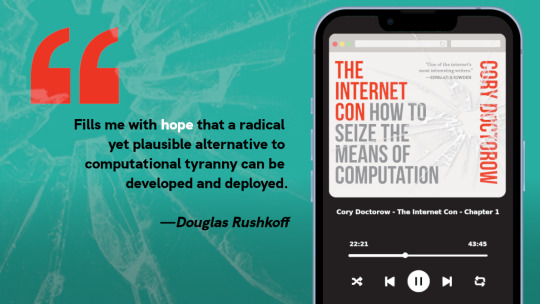
[Image ID: Doctorow has been thinking longer and smarter than anyone else I know about how we create and exchange value in a digital age. -Douglas Rushkoff, author of Present Shock]
To get my audiobooks into readers’ ears, I pre-sell them on Kickstarter. This has been wildly successful, both financially and as a means of getting other prominent authors to break up with Amazon and use crowdfunding to fill the gap. Writers like Brandon Sanderson are doing heroic work, smashing Amazon’s monopoly:
https://www.brandonsanderson.com/guest-editorial-cory-doctorow-is-a-bestselling-author-but-audible-wont-carry-his-audiobooks/
And to be frank, I love audiobooks, too. I swim every day as physio for a chronic pain condition, and I listen to 2–3 books/month on my underwater MP3 player, disappearing into an imaginary world as I scull back and forth in my public pool. I’m able to get those audiobooks on my MP3 player thanks to Libro.fm, a DRM-free store that supports indie booksellers all over the world:
https://blog.libro.fm/a-qa-with-mark-pearson-libro-fm-ceo-and-co-founder/
Producing my own audiobooks has been a dream. Working with Skyboat Media, I’ve gotten narrators like @wilwheaton, Amber Benson, @neil-gaiman and Stefan Rudnicki for my work:
https://craphound.com/shop/

[Image ID: “This book is the instruction manual Big Tech doesn’t want you to read. It deconstructs their crummy products, undemocratic business models, rigged legal regimes, and lies. Crack this book and help build something better. -Astra Taylor, author of Democracy May Not Exist, but We’ll Miss It When Its Gone”]
But for this title, I decided that I would read it myself. After all, I’ve been podcasting since 2006, reading my own work aloud every week or so, even as I traveled the world and gave thousands of speeches about the subject of this book. I was excited (and a little trepedatious) at the prospect, but how could I pass up a chance to work with director Gabrielle de Cuir, who has directed everyone from Anne Hathaway to LeVar Burton to Eric Idle?
Reader, I fucking nailed it. I went back to those daily recordings fully prepared to hate them, but they were good — even great (especially after my engineer John Taylor Williams mastered them). Listen for yourself!
https://archive.org/details/cory_doctorow_internet_con_chapter_01
I hope you’ll consider backing this Kickstarter. If you’ve ever read my free, open access, CC-licensed blog posts and novels, or listened to my podcasts, or come to one of my talks and wished there was a way to say thank you, this is it. These crowdfunders make my DRM-free publishing program viable, even as audiobooks grow more central to a writer’s income and even as a single company takes over nearly the entire audiobook market.
Backers can choose from the DRM-free audiobook, DRM-free ebook (EPUB and MOBI) and a hardcover — including a signed, personalized option, fulfilled through the great LA indie bookstore Book Soup:
https://www.kickstarter.com/projects/doctorow/the-internet-con-how-to-seize-the-means-of-computation
What’s more, these ebooks and audiobooks are unlike any you’ll get anywhere else because they are sold without any terms of service or license agreements. As has been the case since time immemorial, when you buy these books, they’re yours, and you are allowed to do anything with them that copyright law permits — give them away, lend them to friends, or simply read them with any technology you choose.
As with my previous Kickstarters, backers can get their audiobooks delivered with an app (from libro.fm) or as a folder of MP3s. That helps people who struggle with “sideloading,” a process that Apple and Google have made progressively harder, even as they force audiobook and ebook sellers to hand over a 30% app tax on every dollar they make:
https://www.kickstarter.com/projects/doctorow/red-team-blues-another-audiobook-that-amazon-wont-sell/posts/3788112
Enshittification is rotting every layer of the tech stack: mobile, payments, hosting, social, delivery, playback. Every tech company is pulling the rug out from under us, using the chokepoints they built between audiences and speakers, artists and fans, to pick all of our pockets.
The Internet Con isn’t just a lament for the internet we lost — it’s a plan to get it back. I hope you’ll get a copy and share it with the people you love, even as the tech platforms choke off your communities to pad their quarterly numbers.

Next weekend (Aug 4-6), I'll be in Austin for Armadillocon, a science fiction convention, where I'm the Guest of Honor:
https://armadillocon.org/d45/

If you'd like an essay-formatted version of this thread to read or share, here's a link to it on pluralistic.net, my surveillance-free, ad-free, tracker-free blog:
https://pluralistic.net/2023/07/31/seize-the-means-of-computation/#the-internet-con

[Image ID: My forthcoming book 'The Internet Con: How to Seize the Means of Computation' in various editions: Verso hardcover, audiobook displayed on a phone, and ebook displayed on an e-ink reader.]
#pluralistic#trustbusting#big tech#gift guide#kickstarter#the internet con#books#audiobooks#enshitiffication#disenshittification#crowdfunders#seize the means of computation#audible#amazon#verso
15K notes
·
View notes
Text
🐝Scams to Bee Aware of on Tumblr: 🐝
(posted: 2/6/25 - Updated 2/12/25)
The art commission scam.
Are you an artist? Were you DM'd, sent an ask by a blog with no posts or little to no content, or had a comment on a post asking about a commission and to DM them? Did they ask you to draw their son, daughter, or pet? Did hey offer you $200-$500? If so, you should learn about this scam and how to avoid it.
The sugar baby/daddy scam. / Free money scam.
Did you make a post asking for donations? Did someone DM you wanting you to be their sugar baby or promising you money in exchange for something? Did they tell you that you need to send them money to verify you want to 'do this' or pay for 'shipping' or 'transaction' fees? You're about to get scammed!
The muse scam.
If you post photographs frequently, you may find your posts receiving comments from 'artists' saying how 'inspired' they are and how eager they are to make art or a mural for your work. This is a fake cheque scam and you should avoid it at all costs!
The (read more) / Click here! scam.
If you see a post ending in a link that says (read more...) or Click here! This is an attempt to get you to click a link that will lead to a malicious website in an attempt to steal your information, or possibly even install malicious files onto your phone or computer.
is Now Hiring! Scams. ✨New(ish)✨

See a post like this on your dash or in a tag you frequent? Was the user once a normal user and now they're spamming ads like this in unrelated tags? This likely means that user got their account hijacked by clicking the link via a different post. Avoid clicking links like these at all costs!
HRT Medicine / Therapy services ✨New(ish)✨


This scam is targeting transgender people, and is likely stealing peoples personal information and likely their credit card information. If you see or find a blog like the above commenting on your posts, in #transgender or other such related tags, block and report them immediately. (Selling stuff like this is illegal btw.)
Recruitment for the Illuminati.
This scam tries to recruit people into the Illuminati by offering people mass amounts of wealth, homes, and even cars. This is all an attempt to steal your money, or worse, your identity...
Recovery Scammers.
If you make a post talking about how you've lost money, be it bitcoin, crypto, or were scammed in any sort of way, you may find yourself receiving an ask from a recovery scammer. These are people claiming they can offer 'recovery services' while claiming to be 'ethical hackers' that have 'back end knowledge' to online services. Claiming they can retrieve your money, account, photos, and other such lost items. All you have to do is give them your account information and some money! :) (Do not do this, obviously.)
These scammers also target people who post in #scam and/or other related tags like #scams or #scam alert, posting things like this in the comments on peoples posts:
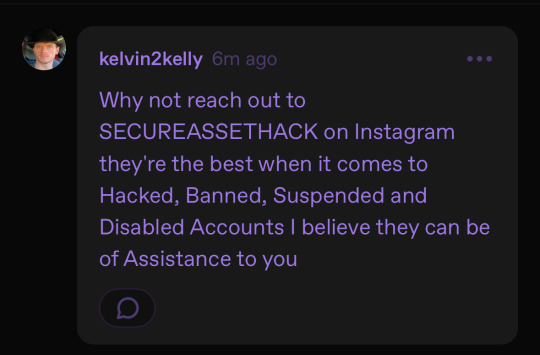
Dropshipping Websites. (Curtsy of @ai-art-thieves)
See a post of an object or a piece of clothing by a popular tumblr user that has 10k+ notes, does it say 'I got this here!' or '>>GET YOURS HERE<<' at the bottom with a link to a store? That user is a part of a dropshipping advertising scheme and are being paid to advertise these scummy websites. These websites are usually malicious in the manner that they sell cheaply products. In the worst case you'll get a bootleg or flawed product, or even a different product completely, or in even worse cases, you'll never get it at all.
(Or they will steal your information in the case of those shopify websites that popup online with deals you 'just can't refuse!!!' So buyer beware.)
Campaign boost/mutual aid support scams. (By @kyra45)
If you or anyone you know has posted looking for donations, and you receive an ask, DM, or even a comment about someone offering to 'assist you in boosting your account/campaign,' all you have to do is pay them <amount>, then this is a fake check scam you should definitely read up on and learn about to avoid.
Pet donation Scams. (by @kyra45)
See a post about someone needing help with a vet bill? Do they stress the pet is in peril and will die soon? Is their PayPal from the Philippines yet the vet bill is from the United states? Those are just two things to look out for with this scam.
Donation / Mutual Aid scams. (by @kyra45)
One of the most common and well known scams on tumblr to this day. These scams mainly revolve around brand new accounts made within a day or week reblogging very few posts and then suddenly asking for money via donations through PayPal. These blogs will send out the same copy/paste ask en masse to dozens if not hundreds of people, change their name frequently over the course of days if not weeks, and will even lie about being Palestinian, stealing stories from legitimate gofundmes, and even having conditions such as diabetes while not even knowing how it works.
Here is a current list of documented PayPal scammers: Part 3
-----
Some helpful blogs to follow:
@kyra45 @ai-art-thieves @u-reblogged-a-scam
Tags to follow/check if you need to check on scams:
#scam #scams #scam alert #scammer #scammers
I also have a very extensive list of scammer call out posts on my main blog, @slenbee under my #scam tag which can be found here if anyone's interested in scrolling through it. Just note that I kindly ask that minors do not follow that blog as it is my personal blog and is not a blog dedicated to scam busting/documenting.
You're 100% ok with looking through the scam tag and reblogging things from it, as well as checking out the links on my pinned post. :)
------
I think that's it for Tumblr scams, If I think I need to add more later I'll update the post and make an update note about it.
Take care everyone and don't get scammed!
-----
Check out the Index of important posts I've made!
Here's a post on some tips and tricks on spotting scam blogs.
How to guide: Reverse Image Search. (now with web extensions!)
Scammers pretending to be Palestinian v6 by @kyra45
#scam#scams#scam alert#donation scam#scammer#scammers#scam awareness#paypal scam#insulin scam#online scams#commission scams#donation scams#internet safety#scam warning#pet donation scam#pet scam#art scam#commission scam#scam list#scams on tumblr#Illuminati
520 notes
·
View notes
Text

Andrew Blaze's Reddit Account & Its Contents




The user u/PioneersProductions was active in the subreddit r/PioneersProductions between October 21 and October 29, 2013. At some point during this period, the subreddit was set to private, which restricts the visibility of comments to third-party tools. Consequently, we are unable to ascertain the specific context of many comments, though some can be reasonably inferred.
10/21/2013, 7:42:05 PM
Nothing can replace BlogTV... YouTube's the easiest fix, but they have it set where you have to stream from your computer now. My internet isn't fast enough to stream. =(
Andrew's initial comment expresses regret over the acquisition and subsequent shutdown of the live streaming service BlogTV, suggesting that she was an active user of the platform.
10/24/2013, 1:06:41 AM
Sweet, wow dude, I can't even remember the majority of these pics. That's insane. Especially the ones from before 2011.
This comment appears to be a response to someone sharing old photographs, possibly of Blaze herself, although this cannot be confirmed.
10/24/2013, 1:12:26 AM
Alligator/Horse Head was created using Paint.NET and Windows Movie Maker. Alligator/Horse Head 2 was made with Photoshop and iMovie. I had two different versions of it: one that was used in the trailer and the one used in the final cut. That Horse Head was difficult to crop out (even with Photoshop) due to the hair on its head. The Alligator was comparatively easy because it was solid wood. Additionally, I posted a video of myself sitting on the floor in my parents' bedroom against a wall, asking for script ideas, intending to feature those whose ideas I used. Ultimately, I did not utilize any of the suggestions. Given that I only had Movie Maker, my options were limited. I would love to recut that video, but it is impossible since the Horse Head has been reduced to ashes. I also lack a clean photograph of it. I wrote Alligator/Horse Head 2 during my senior year of high school in November and did not finalize the script until the following summer. I had numerous drafts for it. James was originally intended to appear physically in the video, but time constraints prevented this, as he had to relocate.
In this comment, Blaze elaborates on the process of creating the videos Mr. Horse Head Meets Mr. Wooden Alligator 1 and 2. These videos represent a crossover between Blaze's character and one created by YouTuber makemebad35.
10/24/2013, 1:16:24 AM
I also dislike how I edited the two videos. The first one was excessively brief, while the second one was constrained by Damian's preference for a shorter duration. Nowadays, I would likely have produced a 10- to 15-minute video; however, 8 minutes seemed adequate for him. He managed to complete his portions in just 5 hours. The only inconsistency in continuity is that he wears the same black shirt at the end, where he calls me to request the Alligator back, which was meant to occur days later. It is implausible that the Alligator could have shipped from Maryland to Pennsylvania and arrived at my doorstep within the same day. I have since become a more meticulous editor compared to two to three years ago. I prefer to extend shots, making them more "film-like" (slower-paced). However, we were concerned that viewers would not watch a 10-minute video in its entirety. I would recut the entire video, but my footage was never stored; I did not acquire a terabyte drive until last year, leaving only a few videos saved on a flash drive.
Four minutes after her previous comment, Andrew provides additional insights regarding the aforementioned videos. The individual named Damian referenced in the comment is makemebad35.
10/24/2013, 1:19:03 AM
I could discuss the Alligator/Horse Head videos indefinitely, which is why I have refrained from revisiting the second one. They were foundational to my YouTube career and led to Horse Head Lives, which will soon connect to my Halloween franchise. ;D
Three minutes later, Blaze concludes her comments on the subject by mentioning the video Mr. Horse Head Lives. I am uncertain what the Halloween franchise refers to, but my best guess is that it pertains to the Finale Series, the initial videos in which Ember appears.
10/29/2013, 9:16:14 PM
You... just... wow....
This remark represents Blaze's final comment on Reddit. The specific context of her expression of shock or surprise remains unclear.
for @strvy-bvllet
#tc community#tccblr#teeceecee#tcctwt#true cringe community#tcc tumblr#tcc fandom#fawnsuga#tee cee cee#truecrimecommunity#true crume#mass shooters#andrew blaze#randy stair
197 notes
·
View notes
Text
You are a friend of Arisu, Karuba and Chota

English is not my native language, so there may be some mistakes. I apologize for that. This is not a full-fledged work, but rather a reflection on "what if they had another friend
[WARNING: blood, character death]
You became friends with Arisu, Karube, and Chota back in elementary school. One day, you witnessed two brave boys named Karube and Arisu standing up for a third boy, Chota, who was being bullied. This deeply impressed your younger self, and you made an effort to befriend them. Luckily, it worked out well as the boys were open to having a new friend. Your friendship lasted even after school, showing the strong emotional bond between you all.
You shared the most interests with Arisu and, since neither of you had jobs, you spent more time together. Sometimes, you and Arisu would tease Karube and Chota by sending selfies from a café where you were playing video games while they were working. In response, they teased you right back.
*You sent a selfie where, in the background, Arisu is playing a computer game.
You: How's your Monday going? We're busy with serious matters… like relaxing for both of you!
Chota: It's so sweet that you have so much free time to do this for us.
Karube: Chota, I have a theory about them.
You: ?
Chota: What is it?
Karube: They spend so much time together not just because they're unemployed but because they're secretly dating!
Chota: EXACTLY!
Karube: Your virginity, Chota, didn’t manage to infect them.
Chota: Hey!
You: Arisu, how do you block users in this app?
Arisu: I was going to ask you the same thing.
Chota is a very religious person thanks to his mother, so from time to time, when you're bored, you accompany him to one of the churches. After the church service ends, you usually go to a small shop to buy interesting new manga and read them together, discussing each character's actions.
Chota points to the distorted face of one of the characters.
—Look, that's you when something goes wrong, the young man says playfully.
—And that's you after your boss gets upset again.
Chota looks at the funny, exhausted face of the character and playfully hugs himself.
—If only you knew how scary he is during those times. I'm tired of him.He looks at you, and you sympathetically pat him on the shoulder.
One day, Karube approached you with an unusual level of concern, surprising you since you'd never seen him like that before. He came to you because he wanted to propose to his girlfriend, Emi. You knew he was dating his boss's girlfriend and had considered talking to him about it because, in that case, Karube was technically the "other man." However, you noticed how his eyes lit up when he talked about the girl he was deeply in love with. So, holding your tongue, you decided it was his business and trusted that he and Emi would figure it out themselves. He explained exactly what he needed from you: since you're a girl, you would know how to impress another girl, and because he noticed that your fingers are similar to Emi's, he needed you to tell him the size of your ring finger. After finishing your discussion, you sincerely hoped everything would go well for Karube.
A few days later, you were sitting in the kitchen, enjoying delicious dashi. You were browsing various job postings because you had decided to start earning money independently. Your phone started vibrating in your hands with a flood of new messages in your group chat of four. From this, you learned that Karube had been fired, Chota wanted to skip work today, and Arisu had argued with his father and left home. Everyone wanted to meet up. They were waiting for your reply, so you quickly typed a message saying you’d join them soon.
Half an hour later, all four of you stood together in the shade. You were quietly giggling at jokes about a zombie apocalypse and, overall, enjoying the warm atmosphere with your friends. Suddenly, Karube lifted Arisu onto his shoulders and began running carefully down the crowded street with him. Chota started recording a video on his phone, and you stayed close to your friends, ready to catch Arisu in case he fell. You didn't doubt Karube's strength, but extra caution wouldn't hurt. The laughter of everyone involved faded when you realized you were on a busy road. Cars were honking at you, and you tried to reach the other side of the street as quickly as possible, avoiding oncoming traffic.
You heard Chota say, "Look, there are fireworks over there!" But you didn’t turn your head, still focused on your goal. Once on the other side, you all agreed to duck into some restrooms to avoid the police. The three guys went into the men’s restroom, and you headed into the women’s.
The guys only wrote in the group chat that everything was fine, but you were distracted when the lights went out. You put your phone in your pocket and decided to step outside. There was no one around except you. You began calling loudly, "Karube! Chota! Arisu!" but no one answered, so you started searching the most likely places. However, Tokyo seemed frozen in time. Late at night, you returned to the road where you’d last been messing around with your friends. A bright light from a billboard caught your attention, mentioning some kind of game. Though cautious, you followed the directions to the indicated location.
Hope still filled your heart that you’d find your friends there. When you entered the building, you saw your friends and ran quickly toward them. They called your name and hugged you tightly.
—We were looking for you, but it was like you disappeared into thin air like everyone else.
Chota said quietly, disbelief in his eyes.
—Where were you?.
Karube’s voice was calm, but there was a hint of worry.
—Did you see anyone else? Do you know what happened?
Arisu was still holding your shoulders as if checking if you were real.
You didn’t get a chance to explain because another girl in a business suit entered. She explained that you wouldn’t be able to leave until you played the game. After her, a schoolgirl arrived, so all of you completed registration, and the "Life or Death" game began.
After the schoolgirl's death, you stayed close to Chota, patting each other’s backs for comfort. In the next round, you pulled Karube away from Arisu, squeezing the blonde man’s hand tightly to keep him from hitting your mutual friend again. Thanks to Arisu’s intellect, you managed to escape the game, but Chota suffered a severe burn.
By mutual agreement, Shibuki and Chota stayed in the shelter while you, Karube, and Arisu went to the next game to search for answers. During a minor argument between you and your friends, you went with Arisu because the boys didn’t want you to attack the man in the horse mask. However, even in the safe zone, there was trouble—if not for the short-haired girl as well as the man with white hair and his taser, you would have died.
You and Arisu were supporting Karube from both sides. The guy had a shallow wound on his side, but he refused to admit he needed help, even though it was obvious. When you returned to the shelter, you helped bandage his wound and stayed close to assist him if needed. The next morning, while everyone was still asleep, you decided to prepare food with the available supplies. Fortunately, there was a gas stove, so cooking wasn't a problem.
The guys immediately started eating breakfast, while Shibuki stood aside, unsure if she was allowed to join. Your gesture inviting her to sit down reassured her, and she joined you without hesitation.
You were worried about Chota: his visa was expiring today, and with an injured leg, he still had to participate in the game. During breakfast, Karube mentioned hearing about the "Beach."
—Let's look for a way there after today's game. Chota and I are out of time, so we can't delay this.
—All right, we'll all go to the game together today, you decided.
In the evening, billboards lit up again, announcing a new game. This time, the venue was Tokyo's botanical garden. Arisu was supporting Karube as they approached a door with a sign reading, "Only four players can participate in the game." This sparked a new debate: Chota and Shibuki had to play since their visas were expiring. Arisu wanted to opt out since his visa was still valid, but you and Karube insisted he participate. In past games, he was the one who guessed everything, so he's useful.
—Let me play. You have a wound that might cause you difficulties.
—Chota also has a wound.
—But his visa expires today, and you have it for a few more days.
—Everything will be fine, Arisu is with me, and you can sit here and wait for us.
—Karub!
However, he quickly went behind the door, which was locked. You have nothing left but to sit quietly and wait.
However, he quickly went behind the door, which was locked. You had no choice but to sit quietly and wait. From time to time, you looked excitedly at the construction of the Shinjuku Botanical Garden, you heard some screams of your friends, but you could not understand what they were saying. Anxiety was taking over you more and more. You wanted to see what was going on inside, but due to the dense vegetation you were unable to do so. You hugged yourself in your arms because of the cold of the summer night, you walked here and there outside, waiting for your friends and Shibuki to come out. With every minute, you were shaking more and more, either from the cold or from a bad premonition. Suddenly, everyone heard several explosions, they were similar to the ones you heard in the safe zone. Then there was a loud desperate scream. You took a stick, opened the door and threw it into the botanical garden. The laser did not penetrate its. You ran toward the screams, shouting the names of your friends:
- Chota! Arisu! Karube! Shibuki! Where are you?!
Your eyes began to gather cool moisture from the possible options, what could have happened. The sound was heard again, but this time it was not a scream, it was someone's loud sobs. You stopped, you didn't even have to breathe to determine the exact source of the sound. The sound came from the right side, so you rushed there without thinking. You saw that this cry belonged to Arisu. He was sitting on his knees, he had headphones and transparent glasses on his head, and there was fresh blood on his face and clothes.
—Arisu!
You quickly approached, sitting next to him, you carefully placed your hands on your friend's shoulders. With your eyes, you looked him over from head to toe with concern.
—Arisu, can you hear me? Where does it hurt? Are you injured? Where are the others?
Arisu was gasping for air, looking at one point, you took your hands off your friend's shoulders and turned completely in that direction. For a moment you forgot how to breathe, very close to both of you Karube lay motionless, and under him was a pool of blood. Your face was pale than any porcelain in the world. You still couldn’t breathe normally, hot tears were flowing down your cheeks, and your eyes were filled with pain and horror. You sobbed, which allowed Aris to finally notice you in this botanical garden. He hugged you from behind, resting his head on your shoulder and started crying harder, he whispered an apology, but you couldn’t hear him anymore. Arisu hugged you tighter. Feeling you in his arms, he remembered what Karube and Chota had told him a few minutes ago.
—Arisu, live for our sake and for y/n. You were all my best friends, I'm grateful to you.
Chota finally took his hand away from Shibuki's mouth, and she hugged him. They both cried because they knew these were their last moments.
—Arisu, when you get out of here, take care of yourself and y/n.
Karube smoked a little more.
—Turn your head, I'm here. Arisu, thank you.
#alice in boderland x reader#alice in borderland#arisu ryohei#imawa no kuni no arisu#karube daikichi#chota segawa#arisu x reader
287 notes
·
View notes
Text
Amazon’s recent decision to stop allowing people to download copies of their Kindle e-books to a computer has vindicated some of my longstanding beliefs about digital media. Specifically, that it doesn’t exist and you don’t own it unless you can copy and access it without being connected to the internet. The recent move by the megacorp and its shiny-headed billionaire CEO Jeff Bezos is another large brick in the digital wall that tech companies have been building for years to separate consumers from the things they buy—or from their perspective, obtain “licenses” to. Starting Wednesday, Kindle users will no longer be able to download purchased books to a computer, where they can more easily be freed of DRM restrictions and copied to e-reader devices via USB. You can still send ebooks to other devices over WiFi for now, but the message the company is sending is one tech companies have been telegraphing for years: You don’t “own” anything digital, even if you paid us for it. The Kindle terms of service now say this, explicitly. “Kindle Content is licensed, not sold, to you,” meaning you don’t “buy a book,” you obtain a “digital content license.”
[...]
Amazon is far from alone in this long-running trend towards eliminating digital ownership. For many people, digital distribution and streaming services have already practically ended the concept of owning and controlling your own media files. Spotify is now almost synonymous with music for some younger generations, having strip-mined the music industry from both ends by demonetizing more than 60% of the artists on its platform and pushing algorithmic slop while simultaneously raising subscription fees. Of course, surrendering this control means being at the complete mercy of Amazon and other platforms to determine what we can watch, read, and listen to—and we’ve already seen that these services frequently remove content for all sorts of reasons. Last October, one year after the Israeli military began its campaign of genocide in Gaza, Netflix removed “Palestinian Stories,” a collection of 19 films featuring Palestinian filmmakers and characters, saying it declined to renew its distribution license. Amazon also once famously deleted copies of 1984 off of people’s Kindles. Fearing piracy, many software companies have moved from the days of “Don’t Copy That Floppy” to the cloud-based software-as-a-service model, which requires an internet connection and charges users monthly subscription fees to use apps like Photoshop. No matter how you look at it, digital platforms have put us on a path to losing control of any media that we can’t physically touch. How did we get here?
28 February 2025
138 notes
·
View notes
Text
DAY 6274
Jalsa, Mumbai Aopr 20, 2025 Sun 11:17 pm
🪔 ,
April 21 .. birthday greetings and happiness to Ef Mousumi Biswas .. and Ef Arijit Bhattacharya from Kolkata .. 🙏🏽❤️🚩.. the wishes from the Ef family continue with warmth .. and love 🌺
The AI debate became the topic of discussion on the dining table ad there were many potent points raised - bith positive and a little indifferent ..
The young acknowledged it with reason and able argument .. some of the mid elders disagreed mildly .. and the end was kind of neutral ..
Blessed be they of the next GEN .. their minds are sorted out well in advance .. and why not .. we shall not be around till time in advance , but they and their progeny shall .. as has been the norm through generations ...
The IPL is now the greatest attraction throughout the day .. particularly on the Sunday, for the two on the day .. and there is never a debate on that ..
🤣
.. and I am most appreciative to read the comments from the Ef on the topic of the day - AI .. appreciative because some of the reactions and texts are valid and interesting to know .. the aspect expressed in all has a legitimate argument and that is most healthy ..
I am happy that we could all react to the Blog contents in the manner they have done .. my gratitude .. such a joy to get different views , valid and meaningful ..
And it is not the end of the day or the debate .. some impressions of the Gen X and some from the just passed Gen .. and some that were never ever the Gen are interesting as well :
The Printing Press (15th Century)
Fear: Scribes, monks, and elites thought it would destroy the value of knowledge, lead to mass misinformation, and eliminate jobs. Reality: It democratized knowledge, spurred the Renaissance and Reformation, and created entirely new industries—publishing, journalism, and education.
⸻
Industrial Revolution (18th–19th Century)
Fear: Machines would replace all human labor. The Luddites famously destroyed machinery in protest. Reality: Some manual labor jobs were displaced, but the economy exploded with new roles in manufacturing, logistics, engineering, and management. Overall employment and productivity soared.
⸻
Automobiles (Early 20th Century)
Fear: People feared job losses for carriage makers, stable hands, and horseshoe smiths. Cities worried about traffic, accidents, and social decay. Reality: The car industry became one of the largest employers in the world. It reshaped economies, enabled suburbia, and created new sectors like travel, road infrastructure, and auto repair.
⸻
Personal Computers (1980s)
Fear: Office workers would be replaced by machines; people worried about becoming obsolete. Reality: Computers made work faster and created entire industries: IT, software development, cybersecurity, and tech support. It transformed how we live and work.
⸻
The Internet (1990s)
Fear: It would destroy jobs in retail, publishing, and communication. Some thought it would unravel social order. Reality: E-commerce, digital marketing, remote work, and the creator economy now thrive. It connected the world and opened new opportunities.
⸻
ATMs (1970s–80s)
Fear: Bank tellers would lose their jobs en masse. Reality: ATMs handled routine tasks, but banks actually hired more tellers for customer service roles as they opened more branches thanks to reduced transaction costs.
⸻
Robotics & Automation (Factory work, 20th century–today)
Fear: Mass unemployment in factories. Reality: While some jobs shifted or ended, others evolved—robot maintenance, programming, design. Productivity gains created new jobs elsewhere.
The fear is not for losing jobs. It is the compromise of intellectual property and use without compensation. This case is slightly different.
I think AI will only make humans smarter. If we use it to our advantage.
That’s been happening for the last 10 years anyway
Not something new
You can’t control that in this day and age
YouTube & User-Generated Content (mid-2000s onward)
Initial Fear: When YouTube exploded, many in the entertainment industry panicked. The fear was that copyrighted material—music, TV clips, movies—would be shared freely without compensation. Creators and rights holders worried their content would be pirated, devalued, and that they’d lose control over distribution.
What Actually Happened: YouTube evolved to protect IP and monetize it through systems like Content ID, which allows rights holders to:
Automatically detect when their content is used
Choose to block, track, or monetize that usage
Earn revenue from ads run on videos using their IP (even when others post it)
Instead of wiping out creators or studios, it became a massive revenue stream—especially for musicians, media companies, and creators. Entire business models emerged around fair use, remixes, and reactions—with compensation built in.
Key Shift: The system went from “piracy risk” to “profit partner,” by embracing tech that recognized and enforced IP rights at scale.
This lead to higher profits and more money for owners and content btw
You just have to restructure the compensation laws and rewrite contracts
It’s only going to benefit artists in the long run
Yes
They can IP it
That is the hope
It’s the spread of your content and material without you putting a penny towards it
Cannot blindly sign off everything in contracts anymore. Has to be a lot more specific.
Yes that’s for sure
“Automation hasn’t erased jobs—it’s changed where human effort goes.”
Another good one is “hard work beats talent when talent stops working hard”
Which has absolutely nothing to with AI right now but 🤣
These ladies and Gentlemen of the Ef jury are various conversational opinions on AI .. I am merely pasting them for a view and an opinion ..
And among all the brouhaha about AI .. we simply forgot the Sunday well wishers .. and so ..



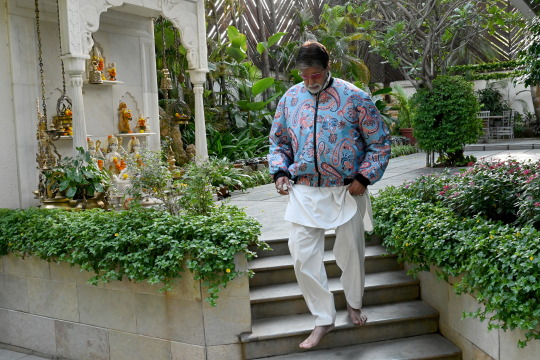
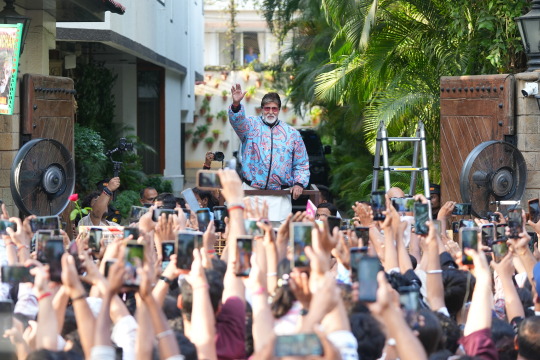

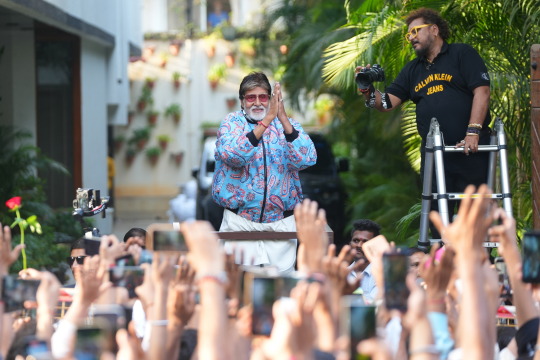

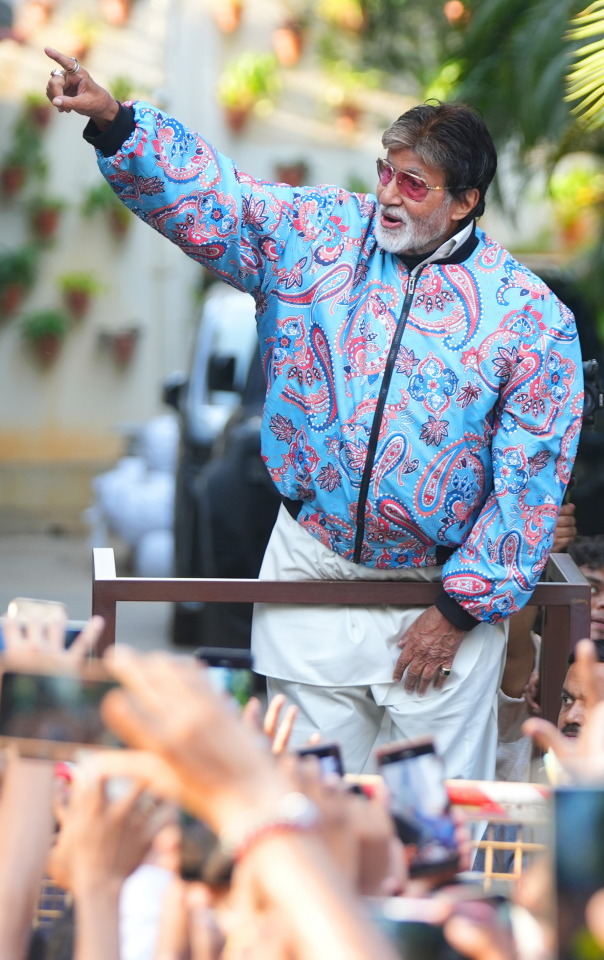





my love and the length be of immense .. pardon

Amitabh Bachchan
107 notes
·
View notes
Text
One thing that I keep seeing whenever I make posts that are critical of macs is folks in the notes going "they make great computers for the money if you just buy used/refurbs - everyone knows not to buy new" and A) no they don't know that, most people go looking for a new computer unless they have already exhausted the new options in their budget and B) no they don't make great computers for the money, and being used doesn't do anything to make them easier to work on or repair or upgrade.
Here's a breakdown of the anti-consumer, anti-repair features recently introduced in macbooks. If you don't want to watch the video, here's how it's summed up:
In the end the Macbook Pro is a laptop with a soldered-on SSD and RAM, a battery secured with glue, not screws, a keyboard held in with rivets, a display and lid angle sensor no third party can replace without apple. But it has modular ports so I guess that’s something. But I don’t think it’s worthy of IFixIt’s four out of ten reparability score because if it breaks you have to face apple’s repair cost; with no repair competition they can charge whatever they like. You either front the cost, or toss the laptop, leaving me wondering “who really owns this computer?”
Apple doesn't make great computers for the money because they are doing everything possible to make sure that you don't actually own your computer, you just lease the hardware from apple and they determine how long it is allowed to function.
The lid angle sensor discussed in this video replaces a much simpler sensor that has been used in laptops for twenty years AND calibrating the sensor after a repair requires access to proprietary apple software that isn't accessible to either users or third party repair shops. There's no reason for this software not to be included as a diagnostic tool on your computer except that Apple doesn't want users working on apple computers. If your screen breaks, or if the fragile cable that is part of the sensor wears down, your only option to fix this computer is to pay apple.
How long does apple plan to support this hardware? What if you pay $3k for a computer today and it breaks in 7 years - will they still calibrate the replacement screen for you or will they tell you it's time for new hardware EVEN THOUGH YOU COULD HAVE ATTAINED FUNCTIONAL HARDWARE THAT WILL WORK IF APPLE'S SOFTWARE TELLS IT TO?
Look at this article talking about "how long" apple supports various types of hardware. It coos over the fact that a 2013 MacBook Air could be getting updates to this day. That's the longest example in this article, and that's *hardware* support, not the life cycle of the operating system. That is dogshit. That is straight-up dogshit.
Apple computers are DRM locked in a way that windows machines only wish they could pull off, and the apple-only chips are a part of that. They want an entirely walled garden so they can entirely control your interactions with the computer that they own and you're just renting.
Even if they made the best hardware in the world that would last a thousand years and gave you flowers on your birthday it wouldn't matter because modern apple computers don't ever actually belong to apple customers, at the end of the day they belong to apple, and that's on purpose.
This is hardware as a service. This is John Deere. This is subscription access to the things you buy, and if it isn't exactly that right at this moment, that is where things have been heading ever since they realized it was possible to exert a control that granular over their users.
With all sympathy to people who are forced to use them, Fuck Apple I Hope That They Fall Into The Ocean And Are Hidden Away From The Honest Light Of The Sun For Their Crimes.
2K notes
·
View notes
Text
A lawsuit filed Wednesday against Meta argues that US law requires the company to let people use unofficial add-ons to gain more control over their social feeds.
It’s the latest in a series of disputes in which the company has tussled with researchers and developers over tools that give users extra privacy options or that collect research data. It could clear the way for researchers to release add-ons that aid research into how the algorithms on social platforms affect their users, and it could give people more control over the algorithms that shape their lives.
The suit was filed by the Knight First Amendment Institute at Columbia University on behalf of researcher Ethan Zuckerman, an associate professor at the University of Massachusetts—Amherst. It attempts to take a federal law that has generally shielded social networks and use it as a tool forcing transparency.
Section 230 of the Communications Decency Act is best known for allowing social media companies to evade legal liability for content on their platforms. Zuckerman’s suit argues that one of its subsections gives users the right to control how they access the internet, and the tools they use to do so.
“Section 230 (c) (2) (b) is quite explicit about libraries, parents, and others having the ability to control obscene or other unwanted content on the internet,” says Zuckerman. “I actually think that anticipates having control over a social network like Facebook, having this ability to sort of say, ‘We want to be able to opt out of the algorithm.’”
Zuckerman’s suit is aimed at preventing Facebook from blocking a new browser extension for Facebook that he is working on called Unfollow Everything 2.0. It would allow users to easily “unfollow” friends, groups, and pages on the service, meaning that updates from them no longer appear in the user’s newsfeed.
Zuckerman says that this would provide users the power to tune or effectively disable Facebook’s engagement-driven feed. Users can technically do this without the tool, but only by unfollowing each friend, group, and page individually.
There’s good reason to think Meta might make changes to Facebook to block Zuckerman’s tool after it is released. He says he won’t launch it without a ruling on his suit. In 2020, the company argued that the browser Friendly, which had let users search and reorder their Facebook news feeds as well as block ads and trackers, violated its terms of service and the Computer Fraud and Abuse Act. In 2021, Meta permanently banned Louis Barclay, a British developer who had created a tool called Unfollow Everything, which Zuckerman’s add-on is named after.
“I still remember the feeling of unfollowing everything for the first time. It was near-miraculous. I had lost nothing, since I could still see my favorite friends and groups by going to them directly,” Barclay wrote for Slate at the time. “But I had gained a staggering amount of control. I was no longer tempted to scroll down an infinite feed of content. The time I spent on Facebook decreased dramatically.”
The same year, Meta kicked off from its platform some New York University researchers who had created a tool that monitored the political ads people saw on Facebook. Zuckerman is adding a feature to Unfollow Everything 2.0 that allows people to donate data from their use of the tool to his research project. He hopes to use the data to investigate whether users of his add-on who cleanse their feeds end up, like Barclay, using Facebook less.
Sophia Cope, staff attorney at the Electronic Frontier Foundation, a digital rights group, says that the core parts of Section 230 related to platforms’ liability for content posted by users have been clarified through potentially thousands of cases. But few have specifically dealt with the part of the law Zuckerman’s suit seeks to leverage.
“There isn’t that much case law on that section of the law, so it will be interesting to see how a judge breaks it down,” says Cope. Zuckerman is a member of the EFF’s board of advisers.
John Morris, a principal at the Internet Society, a nonprofit that promotes open development of the internet, says that, to his knowledge, Zuckerman’s strategy “hasn’t been used before, in terms of using Section 230 to grant affirmative rights to users,” noting that a judge would likely take that claim seriously.
Meta has previously suggested that allowing add-ons that modify how people use its services raises security and privacy concerns. But Daphne Keller, director of the Program on Platform Regulation at Stanford's Cyber Policy Center, says that Zuckerman’s tool may be able to fairly push back on such an accusation.“The main problem with tools that give users more control over content moderation on existing platforms often has to do with privacy,” she says. “But if all this does is unfollow specified accounts, I would not expect that problem to arise here."
Even if a tool like Unfollow Everything 2.0 didn’t compromise users’ privacy, Meta might still be able to argue that it violates the company’s terms of service, as it did in Barclay’s case.
“Given Meta’s history, I could see why he would want a preemptive judgment,” says Cope. “He’d be immunized against any civil claim brought against him by Meta.”
And though Zuckerman says he would not be surprised if it takes years for his case to wind its way through the courts, he believes it’s important. “This feels like a particularly compelling case to do at a moment where people are really concerned about the power of algorithms,” he says.
370 notes
·
View notes
Note
hiii!! this might be a stupid question, but do you have any headcanons on how andre + cal would act online? like would they have their own webpages, and how they would chat and stuff like that :p
also, i love your writing so much <3
Hii!! :3 That’s not a stupid question at all !! And TYSMM IM SO GLAD :D <33 These were fun to make, I hope you like these!
Andre and Cal Online Headcanons,,
Andre’s username on his favorite social/chatting websites is @ak47_0717, while Cal’s is @gunslinger83. The reasoning behind their usernames, first of all, is that Andre’s initials are AK. Because of his unsettling interest in firearms, he’s bound to be interested in one of the most popular guns in the world— the AK-47. He likes having his initials similar to the “AK” in AK-47. The four numbers at the end of his username are his birthday. Cal’s username is pretty self-explanatory; he calls himself a gunslinger, and the ‘83’ at the end of his username is the year he was born.
Andre and Cal talk to each other on AOL, which was one of the most popular online services for internet users at the time. They also chat on MSN Messenger, and they used to communicate on ISQ, which was more popular in their middle school years and early high school years— the late 90s.
With Blogger having been established in 1999, Andre and Calvin created accounts. They follow gun blogs and blogs dedicated to books, movies, and bands they like. Also, Andre follows— although he doesn’t really interact with— the Iroquois Track Team and Science Club blog pages. Cal follows the school band’s page. Despite following different blogs, they don’t really post much on Blogger; they like to stay relatively quiet and unnoticed. Andre does leave hate comments on posts from people he doesn’t like. Since anonymity wasn’t as robust as it would come to be in the mid 2000s— the years following Cal and Andre’s deaths— he made an alt account with a fake name for the sole purpose of hating on the Iroquois Wrestling Team blog page… for obvious reasons having to do with Brad Huff. He also leaves hate comments on Rachel’s posts. Cal mentions this mysterious user to Andre sometimes, mentioning how Rachel talks about how this unknown person on the internet criticizes her posts. Andre plays dumb and acts uninterested, yet he listens intently, replying with soft “Mhm”s, as well as a “Damn, that sucks”. He doesn’t want Cal growing suspicious.
They play girls’ flash games both for the hell of it and for the irony. They get relatively entertained from these online dress-up, salon, and cooking games, with Cal being aware these games are aimed at girls. He intentionally makes his character look ugly and goes into hysterical laughter over it— he absolutely laughs at the stupidest shit. However, Andre actually tries and is surprisingly concentrated on the game, face frozen with stoicism and focus. Andre would never admit it, but with his family having a cat, Mel, he finds pet care flash games to be genuinely fun.
Andre and Cal illegally download music and share it with each other by Napster or by email. They’ve sacrificed their computers for the sake of copying a System of a Down song onto their files for free, instead of physically buying the CD. In 1998, when Andre was still a freshman in high school, he ended up getting the CIH virus (Chernobyl virus) which practically wrecked his software and ruined his computer. Whole Calvin teased him for getting such a destructive virus on his computer, he ended up informing his parents. He’d told them that Andre needed a new computer, and he suggested that they pitch in to help Andre’s parents buy him a new computer for his 16th birthday in the summer. Because for the time being, Andre would have to use Cal’s.
Andre and Cal share similar humor in most areas. And since internet memes were beginning to rise in popularity, the two boys send or email each other dark humor memes and chuckle at them.
If they were alive in 2003, they would have used 4chan !!
Andre uses all types of different acronyms when chatting, such as but not limited to “ROFL”, “LOL”, “LMFAO”, “BRB”, “ILY”, “IDK”, and “BTW”. He often capitalizes the first letter of his messages and types faces like “:-)” and “>:(”.
Cal, too, uses many acronyms online. He also types with no capital letters, and he often takes shortcuts when he’s chatting with Andre. He creates little faces with the keys on his keyboard and copies and pastes special symbols online. When he’s typing to Andre first, his first message is usually a simple, “hi” of some sort.
They both play Doom together, considering how 1993 Doom was multiplayer when it first came out.
GeoCities !! Cal and Andre created their own website for the Army of Two. They didn’t necessarily say much on the site, and they didn’t give the site name to anyone they knew. But they still specified who they were and their interests without giving away their last names.
In addition, Andre and Cal used GeoCities to make a screamer site, and they made different alt emails to troll Brad Huff by sending the link to him, without him finding out who they were.
Sometime during the final week before Zero Day, their last few days of being alive, they’d both typed up a short, lovesick letter in their notepads— two messages they’d always wanted to tell each other but never got the chance to. Cal had gone on a tangent about how much he enjoyed being Andre’s comrade, how much he enjoyed Andre being his. Also, he was saying his goodbyes before their final mission and how he loved Andre and hoped he’d see him on the flip side. Whereas Andre was saying how he was looking forward to escaping the school with Cal and how he hoped they’d have a better life together, even while they were wanted from the cops. He mentioned how he loved Cal, too, but with his own phrasing of that declaration. But that ended up being an unrealistic expectation on Andre’s end.
#zero day#andre kriegman#cal gabriel#calvin gabriel#zero day 2003#zero day movie#caldre#calvin and andre#andre and cal#cal and andre#ben coccio#andre keuck#calvin robertson#cal robertson#calvin zero day#cal zero day#zero day cal#andre zero day#zero day andre#zero day headcanons#zd#zd 2003#zdblr
78 notes
·
View notes
Text
From what is being said on Twitter, Archive Of Our Own is under a DDoS attack.
A DDoS attack: In computing, a denial-of-service attack is a cyber-attack in which the perpetrator seeks to make a machine or network resource unavailable to its intended users by temporarily or indefinitely disrupting services of a host connected to a network.
This is allegedly the work of an anonymous hate group that is "disgusted" by the LGBTQ+ and N SFW content on Ao3 and they intend to continuously attack Ao3 for hours on end. They plan to attack several businesses registered in the US.
They can last up to a day (maybe more, maybe less), unless they are able to put traffic filtering in place.
The best thing we can do is to wait it out, but patiently.
551 notes
·
View notes
Text
Pluralistic: Leaving Twitter had no effect on NPR's traffic

I'm coming to Minneapolis! This Sunday (Oct 15): Presenting The Internet Con at Moon Palace Books. Monday (Oct 16): Keynoting the 26th ACM Conference On Computer-Supported Cooperative Work and Social Computing.

Enshittification is the process by which a platform lures in and then captures end users (stage one), who serve as bait for business customers, who are also captured (stage two), whereupon the platform rug-pulls both groups and allocates all the value they generate and exchange to itself (stage three):
https://pluralistic.net/2023/01/21/potemkin-ai/#hey-guys
Enshittification isn't merely a form of rent-seeking – it is a uniquely digital phenomenon, because it relies on the inherent flexibility of digital systems. There are lots of intermediaries that want to extract surpluses from customers and suppliers – everyone from grocers to oil companies – but these can't be reconfigured in an eyeblink the that that purely digital services can.
A sleazy boss can hide their wage-theft with a bunch of confusing deductions to your paycheck. But when your boss is an app, it can engage in algorithmic wage discrimination, where your pay declines minutely every time you accept a job, but if you start to decline jobs, the app can raise the offer:
https://pluralistic.net/2023/04/12/algorithmic-wage-discrimination/#fishers-of-men
I call this process "twiddling": tech platforms are equipped with a million knobs on their back-ends, and platform operators can endlessly twiddle those knobs, altering the business logic from moment to moment, turning the system into an endlessly shifting quagmire where neither users nor business customers can ever be sure whether they're getting a fair deal:
https://pluralistic.net/2023/02/19/twiddler/
Social media platforms are compulsive twiddlers. They use endless variation to lure in – and then lock in – publishers, with the goal of converting these standalone businesses into commodity suppliers who are dependent on the platform, who can then be charged rent to reach the users who asked to hear from them.
Facebook designed this playbook. First, it lured in end-users by promising them a good deal: "Unlike Myspace, which spies on you from asshole to appetite, Facebook is a privacy-respecting site that will never, ever spy on you. Simply sign up, tell us everyone who matters to you, and we'll populate a feed with everything they post for public consumption":
https://lawcat.berkeley.edu/record/1128876
The users came, and locked themselves in: when people gather in social spaces, they inadvertently take one another hostage. You joined Facebook because you liked the people who were there, then others joined because they liked you. Facebook can now make life worse for all of you without losing your business. You might hate Facebook, but you like each other, and the collective action problem of deciding when and whether to go, and where you should go next, is so difficult to overcome, that you all stay in a place that's getting progressively worse.
Once its users were locked in, Facebook turned to advertisers and said, "Remember when we told these rubes we'd never spy on them? It was a lie. We spy on them with every hour that God sends, and we'll sell you access to that data in the form of dirt-cheap targeted ads."
Then Facebook went to the publishers and said, "Remember when we told these suckers that we'd only show them the things they asked to see? Total lie. Post short excerpts from your content and links back to your websites and we'll nonconsensually cram them into the eyeballs of people who never asked to see them. It's a free, high-value traffic funnel for your own site, bringing monetizable users right to your door."
Now, Facebook had to find a way to lock in those publishers. To do this, it had to twiddle. By tiny increments, Facebook deprioritized publishers' content, forcing them to make their excerpts grew progressively longer. As with gig workers, the digital flexibility of Facebook gave it lots of leeway here. Some publishers sensed the excerpts they were being asked to post were a substitute for visiting their sites – and not an enticement – and drew down their posting to Facebook.
When that happened, Facebook could twiddle in the publisher's favor, giving them broader distribution for shorter excerpts, then, once the publisher returned to the platform, Facebook drew down their traffic unless they started posting longer pieces. Twiddling lets platforms play users and business-customers like a fish on a line, giving them slack when they fight, then reeling them in when they tire.
Once Facebook converted a publisher to a commodity supplier to the platform, it reeled the publishers in. First, it deprioritized publishers' posts when they had links back to the publisher's site (under the pretext of policing "clickbait" and "malicious links"). Then, it stopped showing publishers' content to their own subscribers, extorting them to pay to "boost" their posts in order to reach people who had explicitly asked to hear from them.
For users, this meant that their feeds were increasingly populated with payola-boosted content from advertisers and pay-to-play publishers who paid Facebook's Danegeld to reach them. A user will only spend so much time on Facebook, and every post that Facebook feeds that user from someone they want to hear from is a missed opportunity to show them a post from someone who'll pay to reach them.
Here, too, twiddling lets Facebook fine-tune its approach. If a user starts to wean themself off Facebook, the algorithm (TM) can put more content the user has asked to see in the feed. When the user's participation returns to higher levels, Facebook can draw down the share of desirable content again, replacing it with monetizable content. This is done minutely, behind the scenes, automatically, and quickly. In any shell game, the quickness of the hand deceives the eye.
This is the final stage of enshittification: withdrawing surpluses from end-users and business customers, leaving behind the minimum homeopathic quantum of value for each needed to keep them locked to the platform, generating value that can be extracted and diverted to platform shareholders.
But this is a brittle equilibrium to maintain. The difference between "God, I hate this place but I just can't leave it" and "Holy shit, this sucks, I'm outta here" is razor-thin. All it takes is one privacy scandal, one livestreamed mass-shooting, one whistleblower dump, and people bolt for the exits. This kicks off a death-spiral: as users and business customers leave, the platform's shareholders demand that they squeeze the remaining population harder to make up for the loss.
One reason this gambit worked so well is that it was a long con. Platform operators and their investors have been willing to throw away billions convincing end-users and business customers to lock themselves in until it was time for the pig-butchering to begin. They financed expensive forays into additional features and complementary products meant to increase user lock-in, raising the switching costs for users who were tempted to leave.
For example, Facebook's product manager for its "photos" product wrote to Mark Zuckerberg to lay out a strategy of enticing users into uploading valuable family photos to the platform in order to "make switching costs very high for users," who would have to throw away their precious memories as the price for leaving Facebook:
https://www.eff.org/deeplinks/2021/08/facebooks-secret-war-switching-costs
The platforms' patience paid off. Their slow ratchets operated so subtly that we barely noticed the squeeze, and when we did, they relaxed the pressure until we were lulled back into complacency. Long cons require a lot of prefrontal cortex, the executive function to exercise patience and restraint.
Which brings me to Elon Musk, a man who seems to have been born without a prefrontal cortex, who has repeatedly and publicly demonstrated that he lacks any restraint, patience or planning. Elon Musk's prefrontal cortical deficit resulted in his being forced to buy Twitter, and his every action since has betrayed an even graver inability to stop tripping over his own dick.
Where Zuckerberg played enshittification as a long game, Musk is bent on speedrunning it. He doesn't slice his users up with a subtle scalpel, he hacks away at them with a hatchet.
Musk inaugurated his reign by nonconsensually flipping every user to an algorithmic feed which was crammed with ads and posts from "verified" users whose blue ticks verified solely that they had $8 ($11 for iOS users). Where Facebook deployed substantial effort to enticing users who tired of eyeball-cramming feed decay by temporarily improving their feeds, Musk's Twitter actually overrode users' choice to switch back to a chronological feed by repeatedly flipping them back to more monetizable, algorithmic feeds.
Then came the squeeze on publishers. Musk's Twitter rolled out a bewildering array of "verification" ticks, each priced higher than the last, and publishers who refused to pay found their subscribers taken hostage, with Twitter downranking or shadowbanning their content unless they paid.
(Musk also squeezed advertisers, keeping the same high prices but reducing the quality of the offer by killing programs that kept advertisers' content from being published along Holocaust denial and open calls for genocide.)
Today, Musk continues to squeeze advertisers, publishers and users, and his hamfisted enticements to make up for these depredations are spectacularly bad, and even illegal, like offering advertisers a new kind of ad that isn't associated with any Twitter account, can't be blocked, and is not labeled as an ad:
https://www.wired.com/story/xs-sneaky-new-ads-might-be-illegal/
Of course, Musk has a compulsive bullshitter's contempt for the press, so he has far fewer enticements for them to stay. Quite the reverse: first, Musk removed headlines from link previews, rendering posts by publishers that went to their own sites into stock-art enigmas that generated no traffic:
https://www.theguardian.com/technology/2023/oct/05/x-twitter-strips-headlines-new-links-why-elon-musk
Then he jumped straight to the end-stage of enshittification by announcing that he would shadowban any newsmedia posts with links to sites other than Twitter, "because there is less time spent if people click away." Publishers were advised to "post content in long form on this platform":
https://mamot.fr/@pluralistic/111183068362793821
Where a canny enshittifier would have gestured at a gaslighting explanation ("we're shadowbanning posts with links because they might be malicious"), Musk busts out the motto of the Darth Vader MBA: "I am altering the deal, pray I don't alter it any further."
All this has the effect of highlighting just how little residual value there is on the platform for publishers, and tempts them to bolt for the exits. Six months ago, NPR lost all patience with Musk's shenanigans, and quit the service. Half a year later, they've revealed how low the switching cost for a major news outlet that leaves Twitter really are: NPR's traffic, post-Twitter, has declined by less than a single percentage point:
https://niemanreports.org/articles/npr-twitter-musk/
NPR's Twitter accounts had 8.7 million followers, but even six months ago, Musk's enshittification speedrun had drawn down NPR's ability to reach those users to a negligible level. The 8.7 million number was an illusion, a shell game Musk played on publishers like NPR in a bid to get them to buy a five-figure iridium checkmark or even a six-figure titanium one.
On Twitter, the true number of followers you have is effectively zero – not because Twitter users haven't explicitly instructed the service to show them your posts, but because every post in their feeds that they want to see is a post that no one can be charged to show them.
I've experienced this myself. Three and a half years ago, I left Boing Boing and started pluralistic.net, my cross-platform, open access, surveillance-free, daily newsletter and blog:
https://pluralistic.net/2023/02/19/drei-drei-drei/#now-we-are-three
Boing Boing had the good fortune to have attracted a sizable audience before the advent of siloed platforms, and a large portion of that audience came to the site directly, rather than following us on social media. I knew that, starting a new platform from scratch, I wouldn't have that luxury. My audience would come from social media, and it would be up to me to convert readers into people who followed me on platforms I controlled – where neither they nor I could be held to ransom.
I embraced a strategy called POSSE: Post Own Site, Syndicate Everywhere. With POSSE, the permalink and native habitat for your material is a site you control (in my case, a WordPress blog with all the telemetry, logging and surveillance disabled). Then you repost that content to other platforms – mostly social media – with links back to your own site:
https://indieweb.org/POSSE
There are a lot of automated tools to help you with this, but the platforms have gone to great lengths to break or neuter them. Musk's attack on Twitter's legendarily flexible and powerful API killed every automation tool that might help with this. I was lucky enough to have a reader – Loren Kohnfelder – who coded me some python scripts that automate much of the process, but POSSE remains a very labor-intensive and error-prone methodology:
https://pluralistic.net/2021/01/13/two-decades/#hfbd
And of all the feeds I produce – email, RSS, Discourse, Medium, Tumblr, Mastodon – none is as labor-intensive as Twitter's. It is an unforgiving medium to begin with, and Musk's drawdown of engineering support has made it wildly unreliable. Many's the time I've set up 20+ posts in a thread, only to have the browser tab reload itself and wipe out all my work.
But I stuck with Twitter, because I have a half-million followers, and to the extent that I reach them there, I can hope that they will follow the permalinks to Pluralistic proper and switch over to RSS, or email, or a daily visit to the blog.
But with each day, the case for using Twitter grows weaker. I get ten times as many replies and reposts on Mastodon, though my Mastodon follower count is a tenth the size of my (increasingly hypothetical) Twitter audience.
All this raises the question of what can or should be done about Twitter. One possible regulatory response would be to impose an "End-To-End" rule on the service, requiring that Twitter deliver posts from willing senders to willing receivers without interfering in them. End-To-end is the bedrock of the internet (one of its incarnations is Net Neutrality) and it's a proven counterenshittificatory force:
https://www.eff.org/deeplinks/2023/06/save-news-we-need-end-end-web
Despite what you may have heard, "freedom of reach" is freedom of speech: when a platform interposes itself between willing speakers and their willing audiences, it arrogates to itself the power to control what we're allowed to say and who is allowed to hear us:
https://pluralistic.net/2022/12/10/e2e/#the-censors-pen
We have a wide variety of tools to make a rule like this stick. For one thing, Musk's Twitter has violated innumerable laws and consent decrees in the US, Canada and the EU, which creates a space for regulators to impose "conduct remedies" on the company.
But there's also existing regulatory authorities, like the FTC's Section Five powers, which enable the agency to act against companies that engage in "unfair and deceptive" acts. When Twitter asks you who you want to hear from, then refuses to deliver their posts to you unless they pay a bribe, that's both "unfair and deceptive":
https://pluralistic.net/2023/01/10/the-courage-to-govern/#whos-in-charge
But that's only a stopgap. The problem with Twitter isn't that this important service is run by the wrong mercurial, mediocre billionaire: it's that hundreds of millions of people are at the mercy of any foolish corporate leader. While there's a short-term case for improving the platforms, our long-term strategy should be evacuating them:
https://pluralistic.net/2023/07/18/urban-wildlife-interface/#combustible-walled-gardens
To make that a reality, we could also impose a "Right To Exit" on the platforms. This would be an interoperability rule that would require Twitter to adopt Mastodon's approach to server-hopping: click a link to export the list of everyone who follows you on one server, click another link to upload that file to another server, and all your followers and followees are relocated to your new digs:
https://pluralistic.net/2022/12/23/semipermeable-membranes/#free-as-in-puppies
A Twitter with the Right To Exit would exert a powerful discipline even on the stunted self-regulatory centers of Elon Musk's brain. If he banned a reporter for publishing truthful coverage that cast him in a bad light, that reporter would have the legal right to move to another platform, and continue to reach the people who follow them on Twitter. Publishers aghast at having the headlines removed from their Twitter posts could go somewhere less slipshod and still reach the people who want to hear from them on Twitter.
And both Right To Exit and End-To-End satisfy the two prime tests for sound internet regulation: first, they are easy to administer. If you want to know whether Musk is permitting harassment on his platform, you have to agree on a definition of harassment, determine whether a given act meets that definition, and then investigate whether Twitter took reasonable steps to prevent it.
By contrast, administering End-To-End merely requires that you post something and see if your followers receive it. Administering Right To Exit is as simple as saying, "OK, Twitter, I know you say you gave Cory his follower and followee file, but he says he never got it. Just send him another copy, and this time, CC the regulator so we can verify that it arrived."
Beyond administration, there's the cost of compliance. Requiring Twitter to police its users' conduct also requires it to hire an army of moderators – something that Elon Musk might be able to afford, but community-supported, small federated servers couldn't. A tech regulation can easily become a barrier to entry, blocking better competitors who might replace the company whose conduct spurred the regulation in the first place.
End-to-End does not present this kind of barrier. The default state for a social media platform is to deliver posts from accounts to their followers. Interfering with End-To-End costs more than delivering the messages users want to have. Likewise, a Right To Exit is a solved problem, built into the open Mastodon protocol, itself built atop the open ActivityPub standard.
It's not just Twitter. Every platform is consuming itself in an orgy of enshittification. This is the Great Enshittening, a moment of universal, end-stage platform decay. As the platforms burn, calls to address the fires grow louder and harder for policymakers to resist. But not all solutions to platform decay are created equal. Some solutions will perversely enshrine the dominance of platforms, help make them both too big to fail and too big to jail.
Musk has flagrantly violated so many rules, laws and consent decrees that he has accidentally turned Twitter into the perfect starting point for a program of platform reform and platform evacuation.

If you'd like an essay-formatted version of this post to read or share, here's a link to it on pluralistic.net, my surveillance-free, ad-free, tracker-free blog:
https://pluralistic.net/2023/10/14/freedom-of-reach/#ex

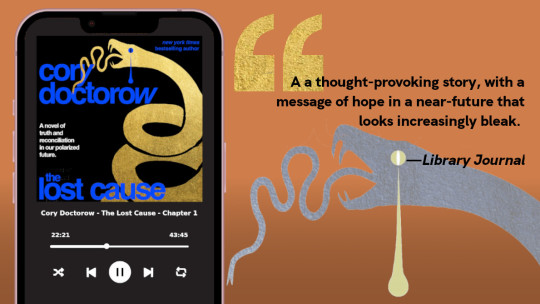
My next novel is The Lost Cause, a hopeful novel of the climate emergency. Amazon won't sell the audiobook, so I made my own and I'm pre-selling it on Kickstarter!

Image: JD Lasica (modified) https://commons.wikimedia.org/wiki/File:Elon_Musk_%283018710552%29.jpg
CC BY 2.0 https://creativecommons.org/licenses/by/2.0/deed.en
#pluralistic#twitter#posse#elon musk#x#social media#graceful failure modes#end-to-end principle#administratable remedies#good regulation#ads#privacy#benevolent dictatorships#freedom of reach#journalism#enshittification#switching costs
801 notes
·
View notes
Text
DUNE AU DAMIAN WAYNE X READER PART TWO
Mild Brutalia
Fem reader
Notes: Under no circumstances should opinions expressed by characters be linked to this author in anyway. This is written in the style of Frank Hebert’s book, this means spoilers for Dune. While inspired by Frank Herbert’s novel the plotline may be similar, however it will not be the same. The following work is apart of a series, the first few chapters will be slow.
Imperial terminology
Bene Gesserit: The ancient school of mental and physical training established primarily for female students after the Butlerian Jihad destroyed the so-called ‘thinking machines’ and robots.
Caladan: Third planet of Delta Pavonis.
Filmclip: An apparatus used mainly for training consisting of a shigawire imprint carrying a mnemonic pulse.
Faufreluches: The rigid imperial system of class stratification.
Spacing (Guild): Powerful organization which ad a monopoly on space travel and transport due to their Navigators.
Mating index: The Bene Gesserit master record of its human breeding program aimed at producing the Kwisatz Haderach.
Mentat: The class of imperial citizens trained for supreme accomplishments of logic. ‘Human computers’.
Sapho: High-energy liquid extracted from barrier roots of Ecaz. Used by Mentats who claim it amplifies mental powers. Users develop deep ruby stains on mouth and lips.
Not many could successfully trick the wise Duke Wayne, many speculated that he was secretly a Mentat due to his intelligence. It has been found that the House Napier (known as the Joker House) spread these rumours to sow dissent within House Wayne. However this did not have the intended impact. Those in House Wayne trusted their illustrious leader more, for if his wisdom was likened to one of a Mentat surely he would lead them down a righteous path.
Commentaries On The New Emperors Family- Empress Y/N
Damian was sitting at the round table in his training and study room, hunched over as his eyes roamed over books spread across the table like a mosaic.
“Damian, my son.” The Duke’s voice echoed ever so slightly in the empty room, Damian looked up at the sight of his father. He was dressed in his formal attire, wearing the colurs of House Wayne- deep blue and coal black.
“Father.” Damian couldn’t hide the excitement in his tone, he hoped his father would be open to the idea of him taking a Bene Gesserit Lady. The girl had been plaguing his thoughts all day, with each breath he took the outline of her visage passed through his head. Though the evidence for her being a Bene Gesserit was slightly shaky, Damian had faith his detective skills.
“Tell me how have your studies been?” The Duke asked in a gentle tone, the firmness of his formal tone absent from his voice. The Duke no longer stood in the doorway as he strode over to Damian and pulled out a chair next to the boy. “Lucius has been telling me that you’re excelling."
“Well I’ve been studying our political history with House Napier.” Damian did not hide his distaste, their feud with House Wayne was well known, “They always fight ruthlessly and with cunning, never have they moved without a meticulous plan. They must have the wisest of Mentat’s in their employ.” Damian knew he was just telling his Father information he knew all too well, but he intended to control the atmosphere of the conversation to favour his bid for a Bene Gesserit. Perhaps he could scare his father into giving him a Bene Gesserit, by convincing him of the necessity of one.
Damian continued on unfettered, “Lucius Fox has done and will continue to do an exemplary job in service of the House, however as I get older I’d like to be able to make more informed decisions with an advisor of my own. One well versed in politics to help me navigate the Imperium, therefore… I’d like to take a Bene Gesserit Lady.” Damian’s tone at the end of his little speech was tinged with nerves.
The silence that followed further tangled the nerves in Damian’s stomach and his posture further tightened. He remembered his mother’s guidance and begin reciting the Litany against Fear.
‘I must not fear, fear is the mind killer, fear is-'
“You’ve clearly thought about this.” The Duke spoke, nothing in his demeanour betraying his emotions.
“Every decision one makes must be well thought out.” Damian responded in kind.
“Have you explored other options? An advisor can come in many forms, what specifically draws you to the Bene Gesserit?” The Duke enquires.
“They have more than one use Father. Not only do the Bene Gesserit have a focus primarily on politics, which Mentat’s do not, they also have strong ties to the other Houses and Guild. They have impeccable espionage skills and are well trained fighters.” Damian had anticipated the question, therefore he already had a preplanned response.
The Duke nodded, once then twice.
“Your mother is a Bene Gesserit. I was opposed to them as a child, they seemed so unnatural and cynical. I couldn't stand their secretive nature. Lucius had to force me to agree to take one as an advisor. Yet when I met your mother I learnt to appreciate them in a completely new light. They were supernatural and assured, completely backed up by their plans and they were resolute in their endeavours. I’m proud of you son for being able to see the true beauty of the Bene Gesserit without needing as big of a shove as the one I had.”
Damian felt himself light up, “Thank you Father, I won’t let you down.”
The Duke placed a reassuring hand onto his son’s arm, “You never have Damian.”
The Duke soon enough left to go continue on his duties, leaving Damian preoccupied with the memory of his dream last night.
“What of the Faufreluches?” Damian recognised the girls voice as easily as talking was to a politician, he felt the winds of Caladan brushing the nape of his neck. “Tell me what you think.” The voice commanded, but not in a harsh manner, however the words were as firm as steel.
Damian was about to respond, but then he woke up.
Something was blocking this dream. No matter, he’d meet her soon enough.
Hope clouds all judgement, it is easy to block the most complex of hopes. Love clouds all judgement, it is not easy to block the very essence of love from thought making.
Lessons from the New Emperor- Empress Y/N
Damian was making a calculated effort to not showcase his complete and utter unrest. A glance at the clock told him he’d been sitting for a minute now, a minute too long. The girl was here somewhere.
The room itself was quietly beautiful. The carvings on the library shelf were shadowed and the orange light of the dawn cast the sharpest of shadows across Damian’s face.
The Bene Gesserit school itself had been checked by Lucius Fox. No traps or secrets lay within these walls to hurt the Ducal heir.
As time wared on, Bene Gesserit candidates came and went like the tides of the waves. Each encounter left him more and more agitated by the last.
While he was waiting for the next, he cleared his mind and took a few deep breaths. Damian focused on the facts he’d gathered from his dreams and inspected each with a detached manner. A seedling of doubt planted in Damian’s mind, had he deluded himself? Were his dreams just dreams? No, he uprooted the thought and cast it aside. Focus, he chided himself, you’re letting your emotions con-
“Would you like more tea, my grace?”
Damian flinched. That voice… he slowly turned in his chair to face the voice. It was her! It was the girl. Then panic set in. Her gentle smile was doing nothing to slow down the racing of his mind. Damian had been wrong.
The girl in front of him was a maid… a Bene Gesserit housekeeper. Not a Bene Gesserit.
Damian struggled to keep his anger leashed, at whom his anger was directed he could not decide.
“Are you not young to be servant?” Damian’s voice whipped out, slashing through the air.
The girl blushed at his brash question, “I am a handmaiden your grace, for whichever Bene Gesserit you chose.”
Was the girl in front of him deflecting?
The trader standing behind him cleared his throat, “Unless you’d prefer one from within your own house to serve the Bene Gesserit lady.” The trader shifted, practically squirming.
“No need, this one will do.” Damian replied instantaneously, “Yes I’d like more tea.”
At his words he turned back around, his fists clenched by his sides. How could he be so foolish, she was only wearing all black because she worked for the Bene Gesserit. What kind of a Duke does not explore all possibilities?
As the girl poured the tea and stepped back, Damian felt too many emotions at once. Quickly he shoved them all back and practiced the breathing techniques his mother had taught him. Till the roaring of his feelings dulled to mutterings.
The Bene Gesserit’s continued flittering in and out, till the last one came.
Damian felt a chill in the air, he straightened up ever so slightly and the trader sucked in a quiet breath. “This is Cassandra, she’s highly trained…,” as the trader continued Damian used the techniques his mother had taught him to assess the Bene Gesserit. Cassandra was very clearly an assassin, her posture was straight and her face impassive. She was not preening to him. In a way Cassandra reminded Damian of his mother- strong and cunning. Cassandra was as mysterious as the dark side of the moon, yet she had a wild fire raging within her and everyone knew wild fires were seldom contained once started.
Damian heard his mother’s voice in the back of his mind, ‘Forming attachments to those who could have the same opportunities is a weakness. That’s why no House ever produces more than one heir to the title. It’s best to prevent the feud between siblings and have a strong, decisive leadership.’
A pang shot through Damian’s heart and blossomed within, Cassandra would have received some of the same training as him and her demeanour mirrored his. Cassandra could be the sister Damian always needed in his life.
Damian ached for a sibling, something to take him away from the loss of the girl of his dreams.
Damian raised a hand, prompting the trader to stop, “That will be all. I will have Cassandra as my Bene Gesserit. The girl may be her handmaiden.” Damian said the second command with a sneer, still at odds with himself for not being able to distinguish, from all his dreams, that the girl was a maid. Damian had allowed his animal instincts to win out and in a way he’d failed. Damian had allowed himself to develop feelings for this girl he’d never met and now he had to face the consequences.
Taglist: @maria-trisha
Thanks for all your support everyone! xx
31 notes
·
View notes
Text
the most introspective analysis of why the hell i'm into Tron fic
So it can be interesting to explore the weird web of connections between what we enjoy in fictional fantasy and what we actually want in real life. I mean, all sorts of connections and contrasts, and our needs and wants in life do bleed into our daydreams and our favorite fiction, in some way or another.
But it's not as simple as just fantasizing about the same thing you want.
And it can be pretty futile to try and theorize reasons why a thing you like in fiction might connect to your real life. Very little chance of proving or disproving anything for sure. Still, sometimes, I guess it can be intriguing just as a sort of… self-exploration exercise.
And I've been trying to do some of that with my love for the Tron fandom.
There are whole other essays I can write about parts of why the fandom appealed to me-- why for example I like the idea of erotic stories set inside a computer world, between bodies made of electronic data-- or why I like to imagine the Programs' anatomy and their acts of intimacy in the exact way I do. And all of that probably says things about me… things that I could put lots of words into analyzing.
But right now I'm going to focus on the bemusing topic of just where that love has ended up fixating.
Primarily on the original 1982 film, and more specifically, on fan theories about the relationship between Programs and the Users who wrote them.
So the premise of the film is simple, in a way that branches into a lot of complexity pretty fast: "What if computer software had feelings?" The setting is Encom, a programming corporation in which all the programs, for some unexplained reason, are alive in humanoid forms resembling the programmers who wrote them. This seems to have occurred spontaneously, unknown to anyone on the outside-- but inside the computer system all the programs just go on living in a mysterious and beautiful world, with their own types of love and work, friendship and conflict and war, and religious faith in their Users.
The supposed main character, Flynn, finds himself inside that world and tries to help them. But he's not the main subject of my fascination. See, he is a human programmer, but none of the humanoid programs he meets in there are his own creations. And the dynamic between creator and creation is where my focus seems to have landed.
The movie's portrayal of a lot of things is subtle and open to interpretation-- which of course is what attracts my puzzle-solving, pattern-recognizing mind! But in particular, the bond between Program and User is a fascinatingly complex and broken mixture of different aspects of different kinds of relationships familiar to humans.
Most clearly on the surface, a mixture of religious devotion and work relationships, and perhaps something of a knight's service to a monarch. Slightly below the surface, hints of the relationship to an alter ego; to a deeper and truer part, or ideal version, of one's own self. And of course, distinct undertones of familial and romantic and definitely erotic love.
The erotic aspect of it really seized my imagination, I have to admit. There's a truly intense sexual energy throughout the scene where Tron, alongside his friends, recharges himself on liquid power until he can "feel the Call" of his creator, Alan-1. And that sexual imagery continues and intensifies as he approaches the Input-Output Tower to answer the Call and contact his User.
It's a religious temple, yes, and guarded by a sort of temple priest-- but the priest's outfit is disturbingly phallic, and the ritual of welcoming Tron into the Tower involves speaking ceremonial words about "growing and extending into the realm of the invisible" while Tron stands with both hands clasped over his groin.
If it were played less solemnly-- and not couched in the middle of an ostensibly family-friendly adventure movie-- this scene would be an obvious sexual comedy, with zero further changes required.
And the other sexual undertones, in other aspects of the movie, all seem to link into this.
Flynn, the one User in the computer world, seems to inspire uncontrollable attraction in programs who get close to him. There is a starkly homoerotic feel to the way Ram looks at him while dying in his arms, and the way Tron holds him while welcoming him aboard the Solar Sailer. Those are the sorts of scenes that will feel as unsubtle as a smack on the face to anyone even remotely sensitive to homoerotic subtext.
But then, even more explicitly, there's the scene at the end when Flynn and Yori kiss-- even though Yori is Tron's established romantic partner, and has no interest in leaving him for Flynn. The pull of Flynn's User-Power was just that strong, in that moment.
Tron and Yori's romance is interesting in itself. It's a relationship that seems to exist as an echo of the established romantic relationship between their programmers, Alan and Lora out in the "real" world. Perhaps Tron and Yori don't even know why they're mirroring those patterns. They clearly love each other, but without all the same context that human love has.
They don't seem to be capable of reproduction, and maybe not even humanoid sex. They don't even kiss until at the very end, after Flynn leaves-- where it's implied that they didn't previously know how to kiss until Flynn showed Yori. Not so much a king's exercise of droit du seigneur, but more like a wedding gift from a god-- a goodbye kiss for Yori and also for Tron, given indirectly through her.
And of course there's the Deleted Love Scene, cut from right before Tron and Yori go to the I/O Tower (but included in DVD extras). They meet up in her quarters, ostensibly to plan how they're going to get to the Tower, but Yori shows immediate interest in sneaking in some intimacy while they're alone together.
She magical-girl-transforms into a diaphanously sparkling cape and opens her arms to him. He approaches her, only to stare somewhat blankly and ask again, "How are we going to get to the I/O Tower?" So she improvises, tracing circuits on his body with her finger, under pretense of illustrating the route they could take.
We get only a few seconds of this, and no vocal or facial reaction from Tron, before the scene fades out. But for what it's worth, the response we see in his circuits is the canon basis for the now-ubiquitous theme in erotic fanfiction, where a program's circuitry can turn purple or pink in response to arousal and stimulation.
...So, from all of this, I got the clear feeling that whatever type of sexuality programs may have, it's focused around their own most powerful motivation. The one that's as strong, in its own way, as the human drive to reproduce.
While human sex evolved around reproducing, Program sex evolved around their own closest equivalent urge-- which is just the urge to contact and serve the Users, in whatever way one is programmed to.
And like reproduction, it's not necessary to sexual pleasure. Programs clearly can touch each other in pleasurable erotic ways, with or without a User involved-- just as humans can satisfy each other's sex drives in plenty of non-reproductive ways. Yori and Tron-- and perhaps Tron and Ram as well-- could have had a lifetime of love and mutual circuit-stimulation without ever going to the I/O Tower.
But Tron, at least, seems to be a little bit of a puritan about it, in my interpretation. He will accept sexual relief from other programs as a stopgap… but whenever possible, he prefers to save himself for his User.
And even if he later adapts, settling into a marriage-like relationship with Yori, under the new peace and freedom of the system-- he will still consider his regular meetings with Alan-1 to be an essential focus of his sexuality, a relationship he would never, ever consider giving up, no matter how much he and Yori also love and satisfy each other.
Program love, I imagine, is very ancient-Greek. Polygamous, often, but with variations in how the love is expressed. Polytheistic, too, but with each individual worshiper particularly devoted to a specific patron god.
And I imagine, in their world, the different kinds of love all come with a sexual component. If Ram is ever data-recovered and brought back to life, I imagine he would be Tron's Philia, alongside the Eros of Yori and the Agape of Alan-1. But in the Program sense of those words, the relationships would all be some degree of sexual, making his wife and his friend and his god all partners in a polyamorous quartet-- perhaps even the true meaning of those four squares over Tron's heart.
(This makes the continuation of the plot, years later in the "Tron: Legacy" sequel, all the more tragic. We're told that Flynn took Tron from his original role as security monitor of the Encom computer, and put him to work protecting a new computer world that Flynn was building. We get pretty much no details of the circumstances of this move, only the disastrous fallout from it many years later. And I find it extremely difficult to imagine a scenario where Tron would have agreed to this uncoerced. Whether or not Ram and Yori got to accompany him, Alan-1 certainly didn't. And this would have devastated the Tron I know.)
(So, for my own mental health-- and also to explain how Flynn got away with pirating Encom's security software-- I imagine that he left the original copy of Tron undisturbed. It doesn't erase the tragedy of what the new copy went through… it probably worsens it, if the copy knows he's a copy, knows his loved ones don't even miss him because he's not even really gone. But at least-- at the very least-- it lets me believe that at least one version of Tron lived happily ever after.)
Anyway. All of this is the context in which I've been trying to understand why the hell my mind-- especially the romantic and sexual parts of it-- find this creator-creation love so very compelling.
It is a fantasy of a true love that's unrealistically pure and complete, I suppose. A program is, of course, made up of conditionals, of if-then statements… but the ones governing the permissions reserved for the User must be deeply integral to identity. Especially in programs like these ones: made by programmers in a 1980's-era corporation, and almost all custom-written to serve specific purposes for their creators.
The only one of them whose ownership resembles that of modern software is Ram-- who is subtly implied to have been written by a programmer at Encom, but was then sold to an insurance company and spent some time serving the public there, before being captured by the enemy and brought back to Encom to be imprisoned.
Ram is the only one who ever calls Flynn "My User"-- and I think this is because, to him, designed for the service of End-Users, his User can be anyone. Which, to my observation, reflects in his constant sweet helpfulness toward all who need it, his fierce loyalty to Tron… and of course (to the horniest side of my observation, but still there) the omnipresent air of seductive sluttiness he gives off, in absolutely every scene.
(I don't know who decided to give that program a name evocative of both "taking it vigorously from behind" and being "random access," but holy hell does it fit him. Ram may be corporate property, but he's the most open-source shareware at heart, and I love him so much for it. Actor Dan Shor definitely understood the assignment.)
But even Ram's love, offered openly to so many, is still so simple and pure in its own way. And for a User authorized to use him, it would be as unconditional as the love of any other program in the cast.
So maybe that's the fantasy? Unconditional love, to a degree humans will never quite manage.
Except that in real life, the very idea of unconditional love makes my skin crawl.
From both sides, actually. To love someone else unconditionally is to make yourself horrifyingly vulnerable to abuse. Dogs have unconditional love, and look how badly dogs get treated sometimes. If you couldn't stop loving even under those circumstances-- if your love doesn't even have conditions like "I'll love you as long as you don't hit me with a rolled-up newspaper and lock me in a kennel all day," then what's to protect you?
And from the viewpoint of the one being loved-- well, being unconditional makes the love pretty much meaningless, doesn't it? If another person's love for you is not even conditional on you remaining the same person in any way-- then they sure don't love you for who you are. Why do they love you? What do they love? Can't even be you, exactly… because it would persist even if every aspect of "you" was replaced with something totally different. And yet, somehow, it always seems to exist in the same space and time as you. Following you like a weird possessing ghost. What the hell is it? Is it just an idea of you? How far removed is that idea from any of what you really are?
It's why I've never found it easy to feel very close to any of my blood family. The idea that they love me in a way like that… a devotion that's everlasting no matter how little we have in common, no matter how vanishingly few parts of my personality fit any description that would ever appeal to them otherwise? Bound to me by… who-knows-what? Ugh. It's the stuff of nightmares.
And yet. Isn't it more or less the same thing as the lines of code that bind Tron to Alan-1? And why do I find that bond so beautiful, when the closest things in human life are eldritch horror to me?
Do I somehow feel that this sort of connection is more appealing for erotic love than familial love?
No… I doubt it. if a romantic suitor felt that kind of attachment to me despite having zero other things in common, it would probably come across as equally creepy, if not more so.
Or is it, maybe, that I feel this sort of connection is appealing for religious love? Is that the aspect of Tron and Alan's multifaceted relationship that makes actual sense to me? Is this the sort of bond I like the idea of sharing with a god?
Also doesn't feel quite right to me. I mean, I have never, personally, been able to believe in a god-- or anything that society recognizes as a supernatural power of any kind.
And yes, I do experience the occasional pleasant fantasy of how nice it could be if there was someone in charge, some plan to all this, some kind and powerful being at the top who knew what they were doing and could be trusted to lead us to a good future! But as it is, I find it pretty much impossible to believe that's happening in this world.
And-- in this world, and in regard to the sort of all-powerful entity I was raised to think of as a God-- I feel that, realistically, it would be very bad if such a thing existed.
Because realistically, it would mean we are under the rule of the most absolute-powered, absolutely-corrupt dictatorship imaginable, with no hope of escape, ever. A ruler who constantly (according to our observation of the world) does things, allows things, and (according to various religious texts) commands us to do things, which are downright evil according to our own emotions and our own capacity for reason--
--and which we have no choice but to consider good. Because in the framework of this faith, we have to believe that there is an objective, unquestionable standard for what "good" is-- and we have to believe that this absolute ruler of the universe is the source of that standard, and our only reference for what that standard is. No matter how terrible it feels to us, and how difficult it is to come up with any possible reasoning for how it could be good.
God by definition is good, and Good by definition is what God wants. Perfect circle. To me, a perfect, horrifying dystopia.
So I'm not exactly sure where the User/Program fascination originates for me. Sure, it's a deeply compelling meld of romantic, familial, workplace and religious relationships-- and yet in my own life I pretty much hate the power dynamic, the affront to personal freedom, that goes along with all of those.
And yeah, that includes romance. That same aversion to relationships with total, unconditional devotion is probably part of why I am so close to aromantic, in terms of my connection to other real-life humans.
I have experienced living in a marriage. I have experienced relationships that tried to call themselves romance. And all I can say is that I didn't feel I'd found anything resembling a fulfilling relationship… until I experienced living in the loosely-connected polycule I discovered during my time in LA.
That specific setup didn't work out, for a lot of reasons none of us could fully control, but the taste of it convinced me that this is the kind of relationship I want in my life. A house of roommates who are affectionate friends-with-benefits-- but with enough space to allow everyone a room of their own and clear boundaries. And an understanding that physical and sexual contact between any of these companions can be an acceptable thing, if the people involved want it, but not otherwise.
Enough people that if the arrangement isn't working out for any one of them, that one can feel somewhat free to move on to a better place, without fear of abandoning anyone else all alone.
Enough people that there'll usually be someone there for you, for whatever you need-- whether it's practical help, social company, or sexual relief.
But also enough people that no individual person feels an obligation to always be the one there for anyone else.
I dread the kind of devotion that makes someone feel that obligation, to be always there for someone. It feels to me like it violates personal autonomy. It means any consent you give to anything is automatically unreliable-- how can you, or anyone, be sure you're not just agreeing to something you don't want out of obligation?
I know I have a fierce independent streak. And I'm realizing lately that it's not so much a concern for either "appearing weak" or "imposing on others" -- it's mainly just because other people can't be depended on.
And that's not an insult to them! And the idea that it could be considered an insult says terrifying things, to me, about what society expects of people. Because what does it mean, when you're expected to be someone that people can depend on, can rely on? It means your own needs always come after that. It means you are a step away from being enslaved, being property, having no right to put your own needs first.
And sure, when people say someone is "dependable" or "reliable," they rarely mean it in a sense that extreme. Either they are just saying that person is pretty often willing to help-- not nearly always, but just in comparison to other people who are very seldom willing to help--
--or, they do mean the person is always or almost always willing to help-- and they haven't given actual, serious thought to whether that worryingly high willingness is real, or coerced by obligation.
But I give that a whole hell of a lot of thought. When I say I can't depend on other people, I am saying I can't expect to own them as slaves.
And yes, I do know that there are some necessities where it's vital to have something you can rely on more than any one human being should ever be expected to be reliable. For me, often that "something" is a system of my own that I come up with-- one of my fiercely-independent ways of taking care of my own necessities.
And when I can't come up with such a system on my own, the next best option, for me, is to have a large group of people to rely on. I do feel that people can't ethically be treated as "reliable" on an individual level. But as a group, with responsibility spread out enough, it becomes, sometimes, a valid option.
Anyway.
I guess, with all that infodump, I've just painted a pretty clear picture for you of what I'm like to live with.
And in the process, I guess I've made it abundantly clear that in real life, I pretty much loathe the idea of being on either side of anything resembling this Program/User relationship that I romanticize so hard in my fantasies.
So… what gives?
I mean. I'm aware of the whole gamut of things people can enjoy in fiction and fantasy, regardless of how bad they'd be in reality. And I don't judge. But I know that my own fantasies-- the things I personally like to imagine as pleasurable escape-- don't tend to eroticize or romanticize any of the stuff I consider dystopian. At least, when dystopia appears in my fantasies, it's in the context of protagonists working together to fight against it.
My pleasures don't get that dark… not to the point of delighting in the thought of hurt without comfort; torment without love or enjoyment. I can read and appreciate many well-written stories, regardless of topic. But if I read a story where someone is hurt, in a way they don't want and don't enjoy on any level, that dynamic itself will not be an aspect of the story that gives me pleasure.
And when I imagine Programs and Users, I don't even fall into that happy fantasy I mentioned earlier-- the fantasy of a world where God is truly good and has a trustworthy plan for it all. In the context of Tron canon, the Users aren't that kind of gods-- they're human programmers, they're messy and imperfect and sometimes outright malicious, and they rarely have a clear idea of what they're doing or how it's going to go.
And in my daydreams, I don't even imagine that the programs believe in that nice little fantasy. Maybe some of them do at first, like Tron did before Flynn cleared things up in that scene on the Solar Sailer. But as Users and Programs get to know each other's true selves more deeply, growing the relationship into the kind of love I daydream about-- they learn how messed-up it is.
They have no illusions, eventually. The program knows that the User is their superior only in terms of software permissions-- and in many other ways is actually less rational, less capable of untainted ethics and unbiased reasoning than a Program is.
And the Program loves the User anyway. Whole-hearted, unwavering devotion, the deepest motivation and the greatest fulfilment in their whole life-- even knowing that this is all just the result of lines of code somewhere forcing them to feel that.
It doesn't matter. Even with full understanding, those lines of code still make themselves sacred in the Program's eye, and the love persists.
Which, to me, somehow… actually feels perfectly fine? No different from enjoying human emotions and sensations while knowing the evolutionary reasons behind them.
Sure, I can delight in the feeling of affection for others in my life, and the joy of being close to those I feel it for. Sure, it's just chemicals, just oxytocin and serotonin and the bodily reactions they set off, and it evolved to increase survival rates by keeping the social unit together to cooperate in raising the young and hunting food and so on. But who cares. The point is, it feels good.
Sure, I take pleasure in eating good food because my body uses dopamine as an incentive for that action to ensure I stay nourished. Sure, I enjoy sex for the same reason, even though my ancestors evolved that hit of pleasure because it incentivizes reproduction, and yeah, I don't personally plan to reproduce. It still feels good.
So… where's the disconnect?
Why can't I appreciate the idea of real-life familial love or romantic love or religious love in that same way? Why is it just the fictional Program/User versions that I find so attractive-- as well as those specific emotional and sensory experiences that feel to me like the closest thing to real-life equivalents?
And…
And wow, I think writing this all down just helped me figure it out, just now.
And… damn it. Really? Took me this long?
Did I forget the most self-indulgent Program/User fic I've ever written? Even with "A Lightcycle Built For Two" under my belt, I seriously didn't figure this out sooner?
Yay me.
It's not the romantic love. It's not the religious worship. It's not the familial relationships or the workplace relationships.
All of those-- plus the most literal surface imagery, the Program and User themselves-- are vehicles to convey different aspects of a feeling. All of them bring me something, some little frisson of feeling that I enjoy, amid all of what I don't.
But the context in which I like that feeling isn't actually any of the relationships serving here as metaphors.
It's the other one, the one I just barely mentioned only in passing.
The freakin' REASON why it resonates so much with me that Tron programs are played by the same actors as their programmers.
That bit about "relationship to an alter ego; to a deeper and truer part, or ideal version, of one's own self."
It's about that same knightly service, that same unconditional love, that same fierce whole-souled devotion--- but not to someone else.
To being who I am. My best version of me. All the parts of it.
It's about loving myself.
THAT's what resonated with me. THAT's why I like what I like.
Hell yeah.
21 notes
·
View notes
Note
If you use the same email for everything, that email and every account associated with it is probably compromised due to this.
wait what? what exactly does this entail?
Recently, the Internet Archive faced a severe security breach that leaked the account info of all of its users.
Longtime security researcher Troy Hunt, who runs the data-breach-notification website Have I Been Pwned (HIBP) also confirmed that the breach is legitimate. He said it occurred in September and that the stolen trove contains 31 million unique email addresses along with usernames, bcrypt password hashes, and other system data.
(via Wired)
What this means is that the email address and password you used for your Internet Archive account is public information. (You can check Have I Been Pwned to see if your info is a part of this breach, but assume that it is.)
Most people use the same password for most things. Let's imagine you have a pretty secure password, like th1sISap@ssw0rd!!. This follows all the contemporary rules for passwords: it has lowercase and uppercase letters, numbers, and symbols, and is decently long. So let's say you use this password for your Internet Archive account, and your email address, but your Discord account has a different password.
Someone can look at your leaked info from the Internet Archive and try your password on your email. Now they have access to your email address. That's a very bad thing, since most services online use your email address to confirm that you're who you say you are. Now they can also access your Discord account by sending a password reset request. And Discord account hacks are actually pretty common. Not via these means, for the record: most Discord account hacks take place over Discord itself, usually as a fake link posing as some "oh no I reported you and now you need to contact staff to undo it" (pro tip, if anyone ever says that, they're lying. Social media staff know what misclicks are and also most social media uses an algorithm anyway).
With your Discord account, they can now pose as you - a known legitimate user, who people will want to trust - to try and scam people. Not great. Also, you probably don't want other people to have access to your account.
So, what should you do about it?
Change your email account password. All of your passwords should be unique to that account, but especially email, since it's the 'hub' of logins and if someone has your email they can just send a forgotten password request.
If you have a phone, you can set up two factor authentification. What this means is that you authenticate that you're the owner of the account via one factor, your password, and then an entirely separate factor, your phone. If someone wants to hack something with 2FA, they first need to figure out your username & password, and then guess your 2FA code. Most 2FA codes reset every 30 seconds, so even with brute forcing it's nearly impossible and not worth it.
Stop using the same password for everything! I understand why people do this & there's no shame in it but the more similar your passwords are, the more at risk you are after pwnage. There are plenty of password managers out there: I personally use Bitwarden. Your browser's native password manager is probably fine, but you've got to start taking its suggestions when it wants you to use an ultra-secure password that you'd never be able to remember. Pro tip: You don't need to remember it. The password manager will remember it for you. Bitwarden has a mobile app if you need to login to stuff on your phone, and it also lets you easily carry passwords between computers.
I'd also recommend going through and seeing if you can delete old accounts for websites you no longer use. Having less accounts reduces your risk of being pwned simply because there's less datasets you're in that could be pwned.
I hope this helps ^^; & keep in mind that being pwned is not the end of the world. Even with your info being out there, someone's still got to choose your account of the 31 million that got breached in the Internet Archive leak. Additionally, your accounts might not even be compromised at all - I'm pretty sure I'm fine even though my email was in the leak, since I have a unique password and 2FA for my email, and unique passwords for all my other accounts too.
#internet archive#internet archive breach#data breach#?#idk wtf tags to use with this lol#answered asks
54 notes
·
View notes